Best non-toxic coffee makers 2025 – we love these stainless steel, glass, and BPA-free alternatives
Following medical advice, we tested the best non-toxic coffee makers for healthier, delicious coffee
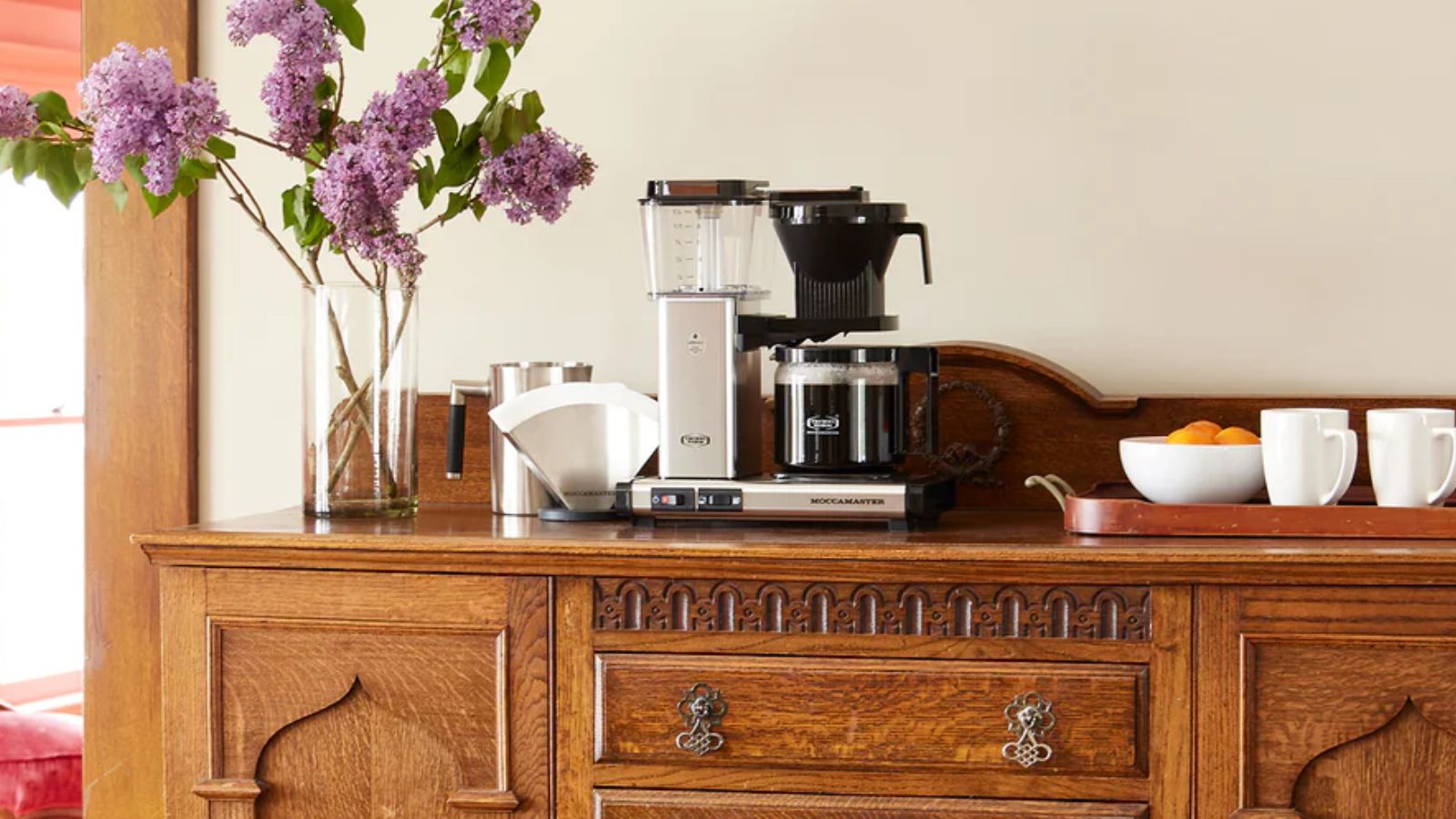

Laura Honey
Investing in a plastic-free coffee maker is smart. Experts have reassured us that most of the top coffee makers on the market are non-toxic and safe when used correctly. However, as soon as glass or stainless steel elements are replaced with lighter, cheaper plastics, there are some causes for concern.
Kelly Johnson-Arbor, a medical toxicology physician and interim executive director at National Capital Poison Center says: ‘Plastics used in even the best coffee makers can contain potentially dangerous chemicals, including BPA and PFAS’. These are used in lots of everyday kitchen products because they’re stain-resistant and waterproof. Dr. Kelly told us that BPA is associated with health issues, including endocrine disruption and impaired fertility (you can read more about this on the FDA website).
That’s why we’ve spent 50 hours testing the best non-toxic coffee makers on the market, crafted with glass, stainless steel, and BPA-free elements. Overall, we had more luck with manual brewers, like French presses, pour-overs, and moka pots. These are simpler machines that use just one or two materials, often glass or stainless steel. My personal favorite is the Aeropress Premium, which replaces any pod machine with speedy, smooth single-serve coffee from a beautiful glass chamber.
However, we also had success with drip coffee machines – and the OXO 8 Cup Drip Coffee Maker came out top in our tests, with a five-star rating that's hard to argue with. Here's everything you need to know. If you would like more information, we also have an article where medical experts answered our question, ‘Are coffee makers toxic?'
The quick list
If you want a summary of the best non-toxic coffee makers on the market, here are the best of our tests. We'll go into more details further down the page.
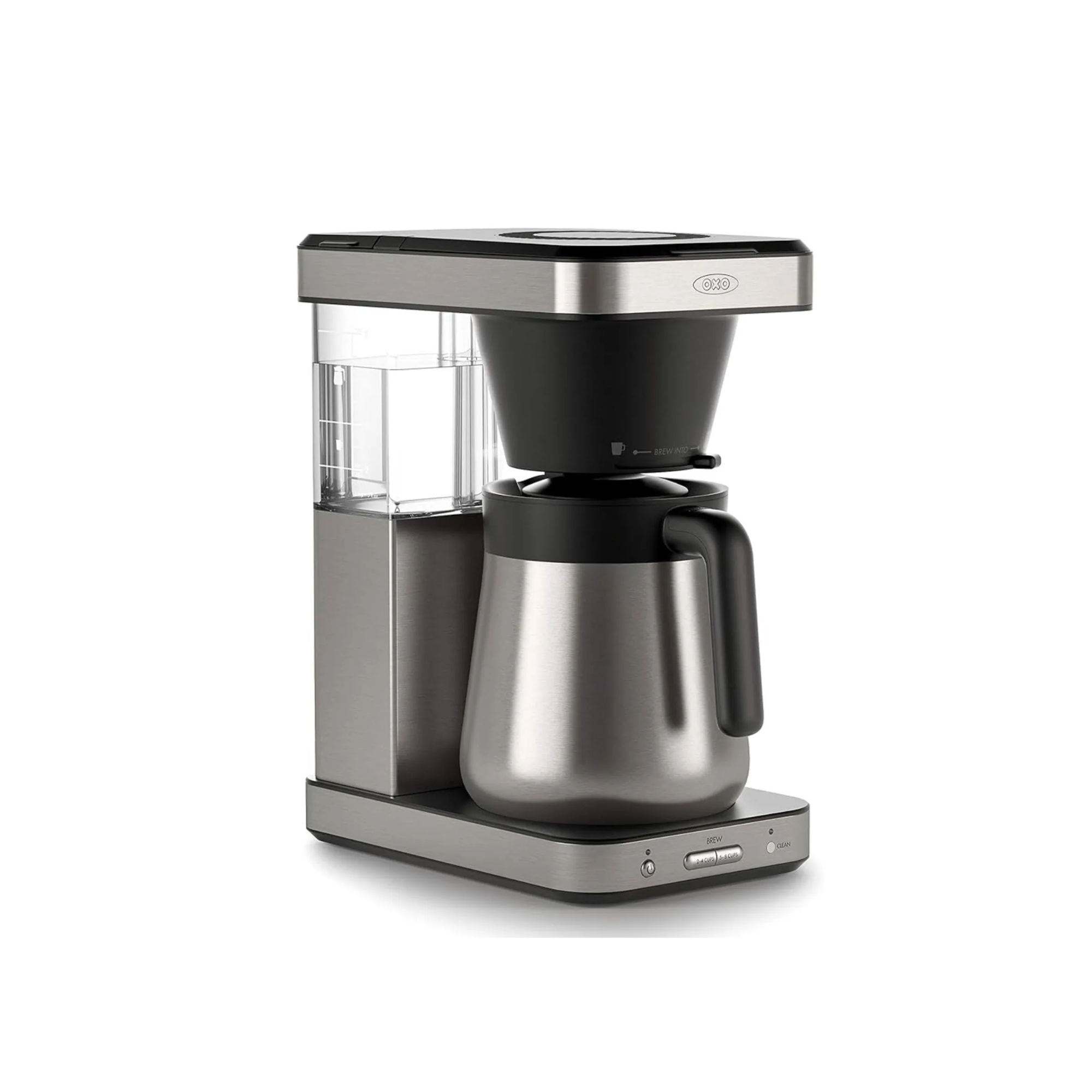
A balance of high-quality coffee, affordability, and non-toxic materials (stainless steel and BPA-free plastic). It's SCA-certified for brewing great-tasting coffee in under six minutes.
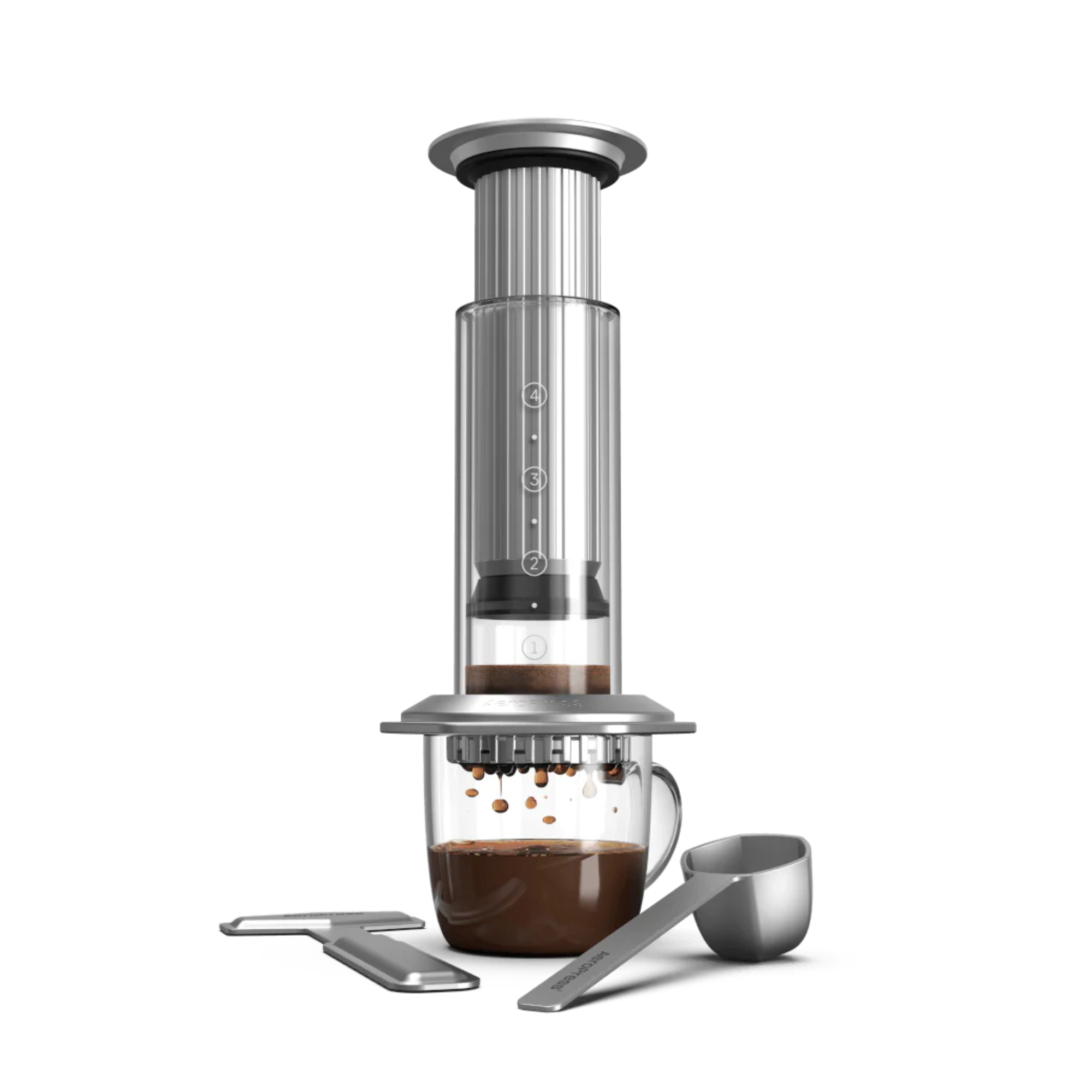
Looking for speed? Forget plastic pod machines. The Aeropress Premium is made from stainless steel and high-quality glass. It is easy to use, and even simpler to clean, but it only makes americano or espresso for one person.
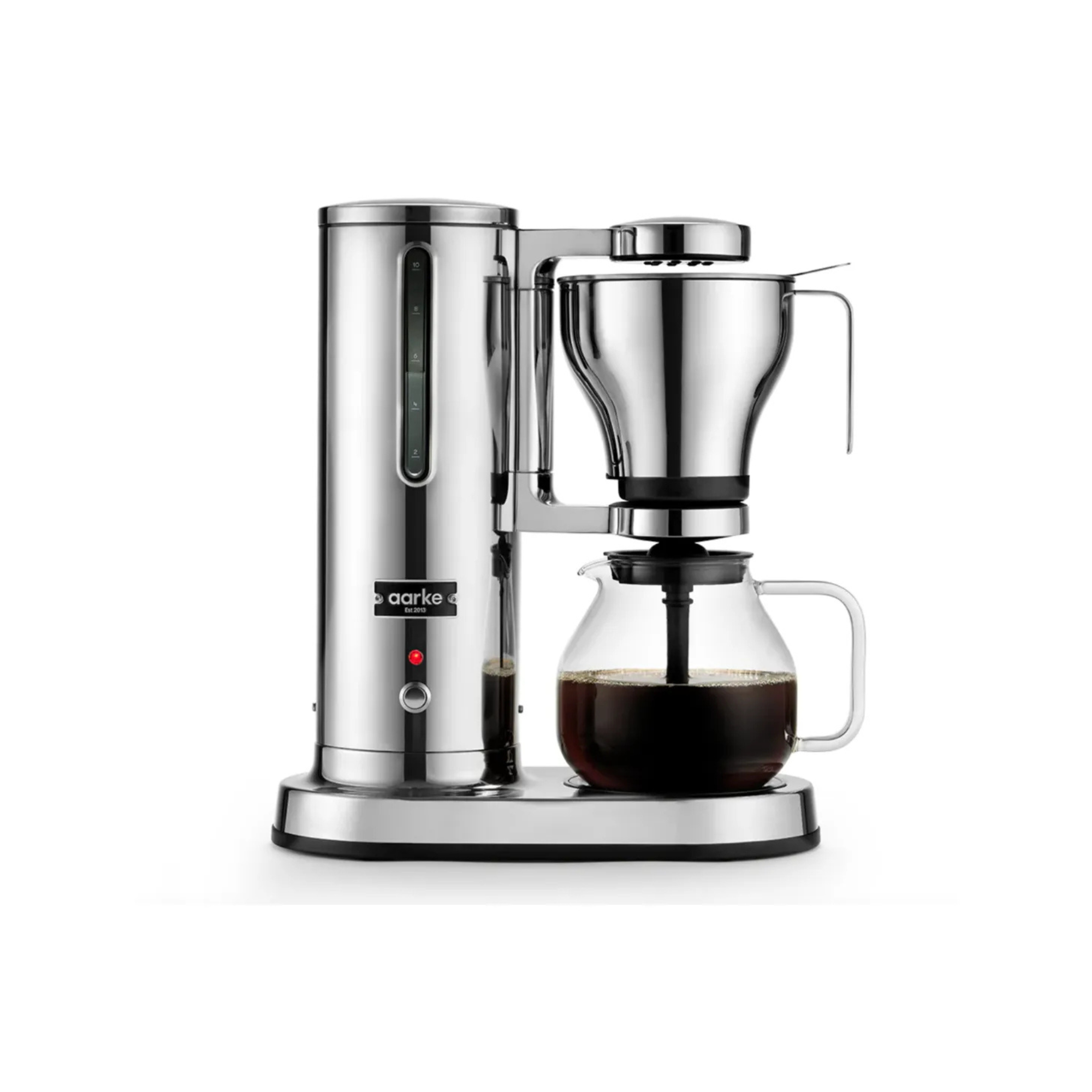
With 10-cup capacity, this is a sleek machine made of stainless steel and glass. Ideal for serving quality drip coffee for the whole family or guests.
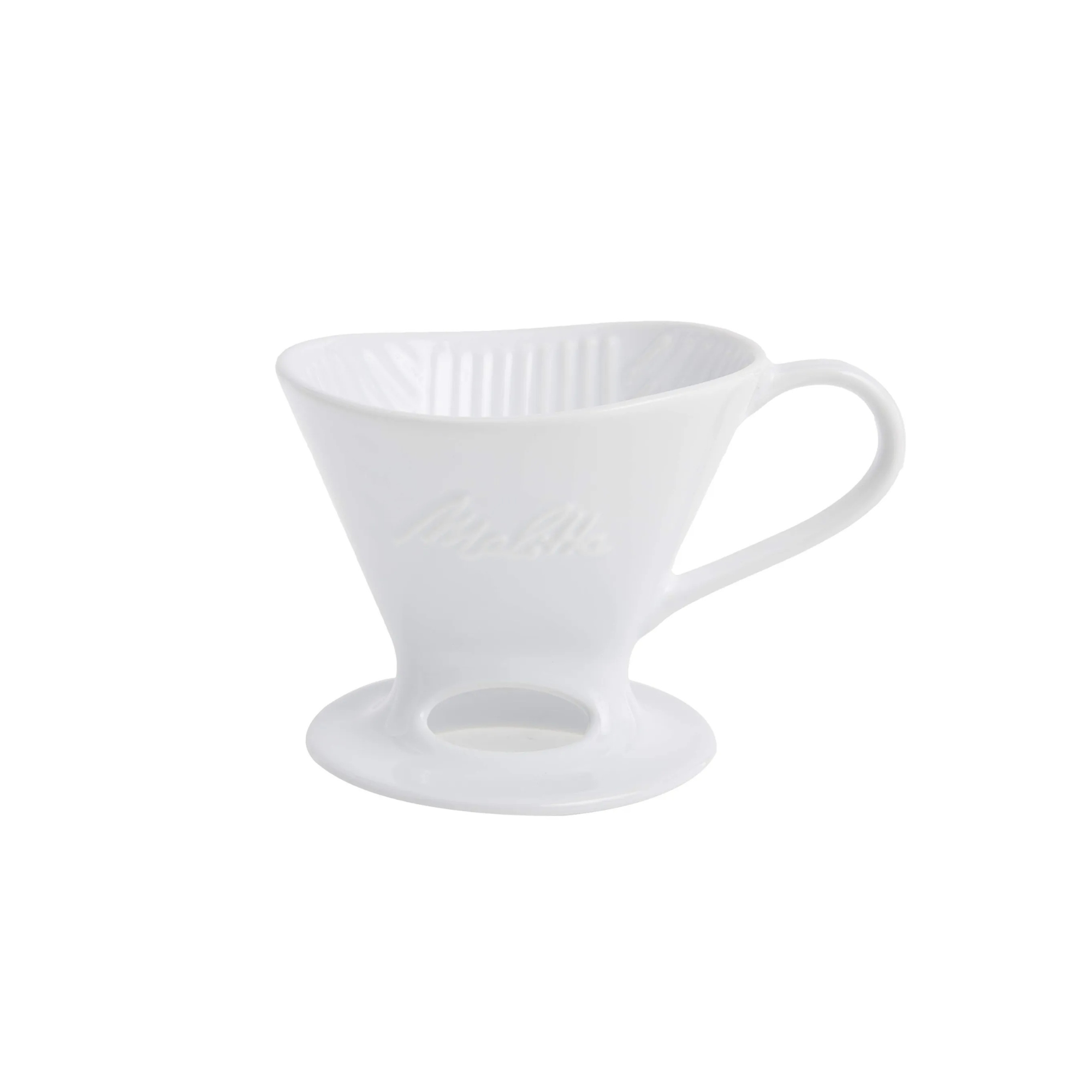
This pour-over is under $20, yet it is made from high-quality porcelain and no plastics. You're limited to making one cup at a time, but it's easy to use and makes a smooth coffee.
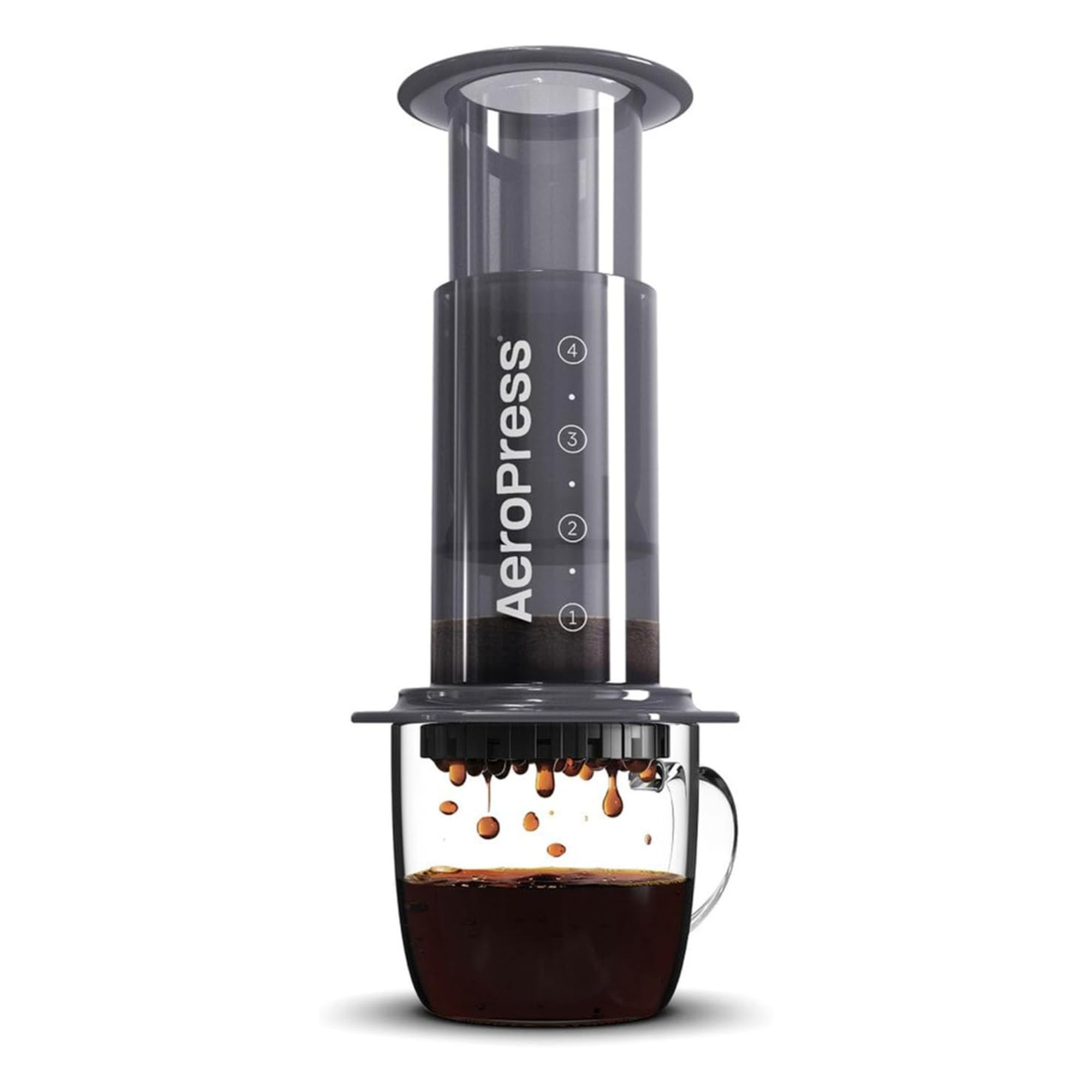
The original Aeropress is made from BPA-free Tritan plastic, which is hardy and super lightweight, so you can take it anywhere – from the office to the airport.
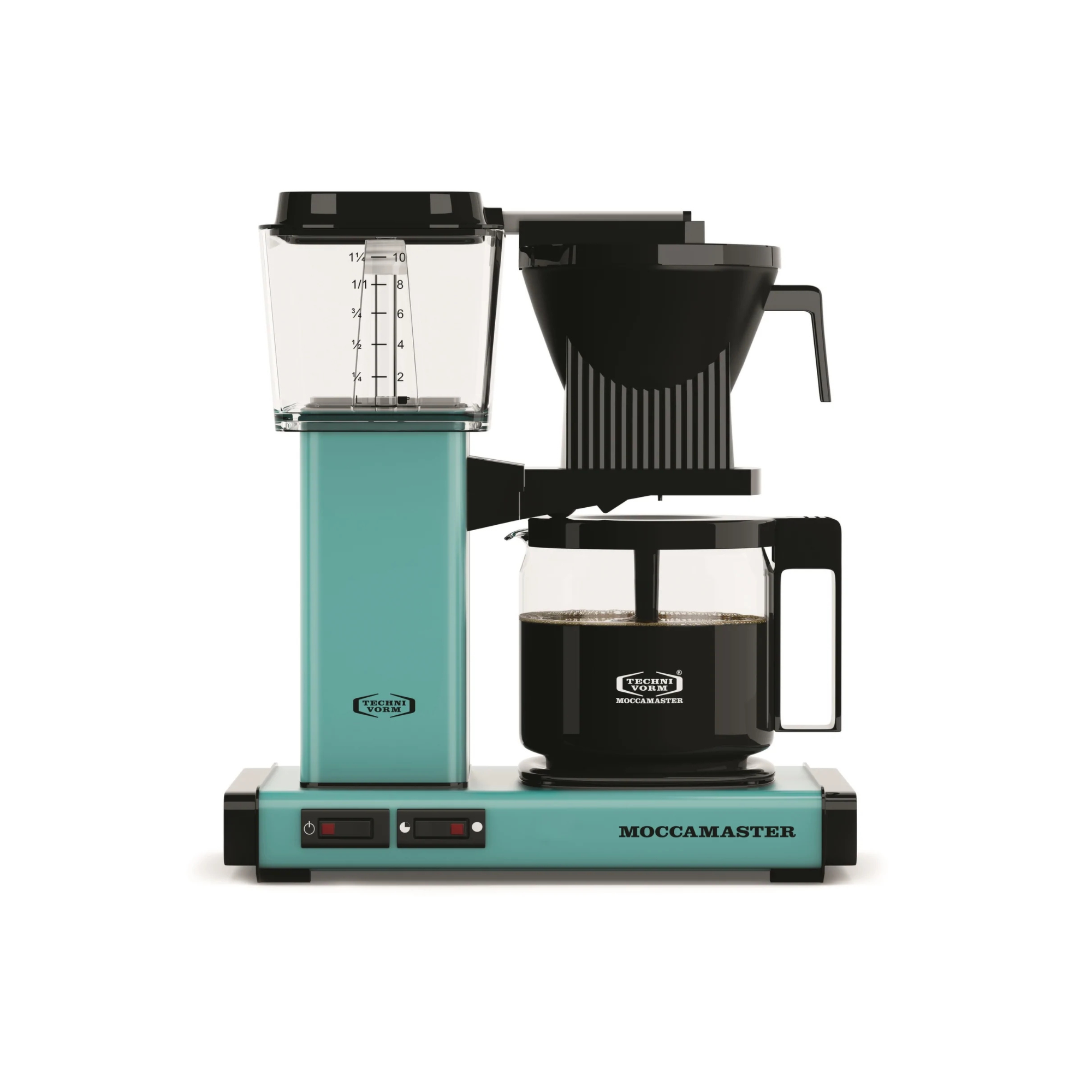
This retro design is available in many bold and quirky colors. It's handmade in the Netherlands with stainless steel and high-quality plastics that are free from BPA and PFAS. The coffee is as rich and unique as the design.
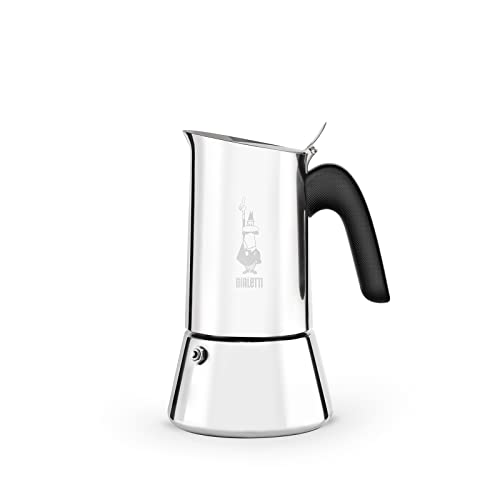
If you prefer rich, velvety coffee, go for this chic Moka pot. Crafted from stainless steel (instead of the traditional aluminum), this Italian brewer works on both gas and induction stoves.
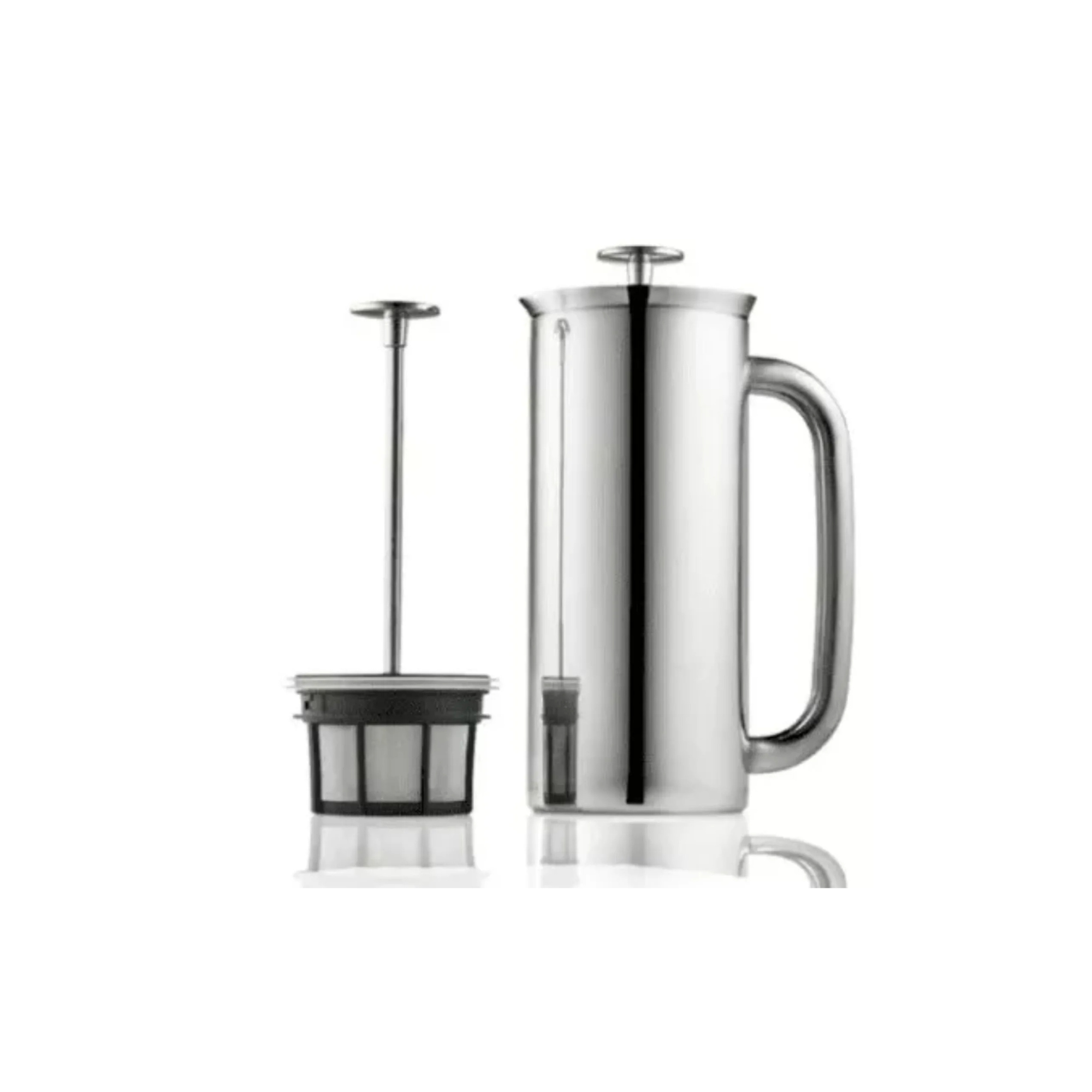
We think this is the best French press money can buy, so it's no wonder it's made from the most premium, durable, and safest material. The stainless steel is double-walled, so your coffee stays warm for hours.
Best non-toxic coffee makers 2025
1. Best overall
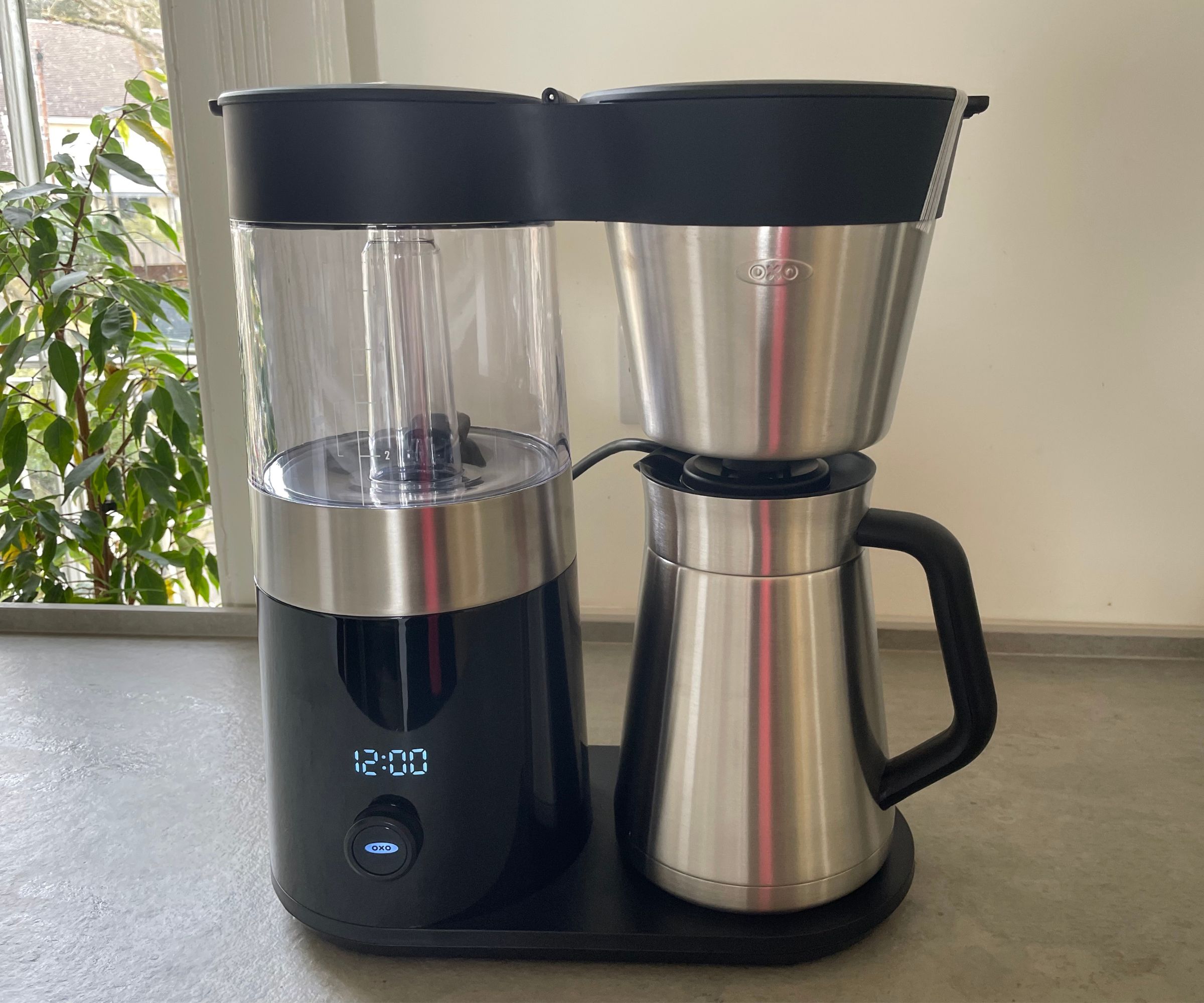
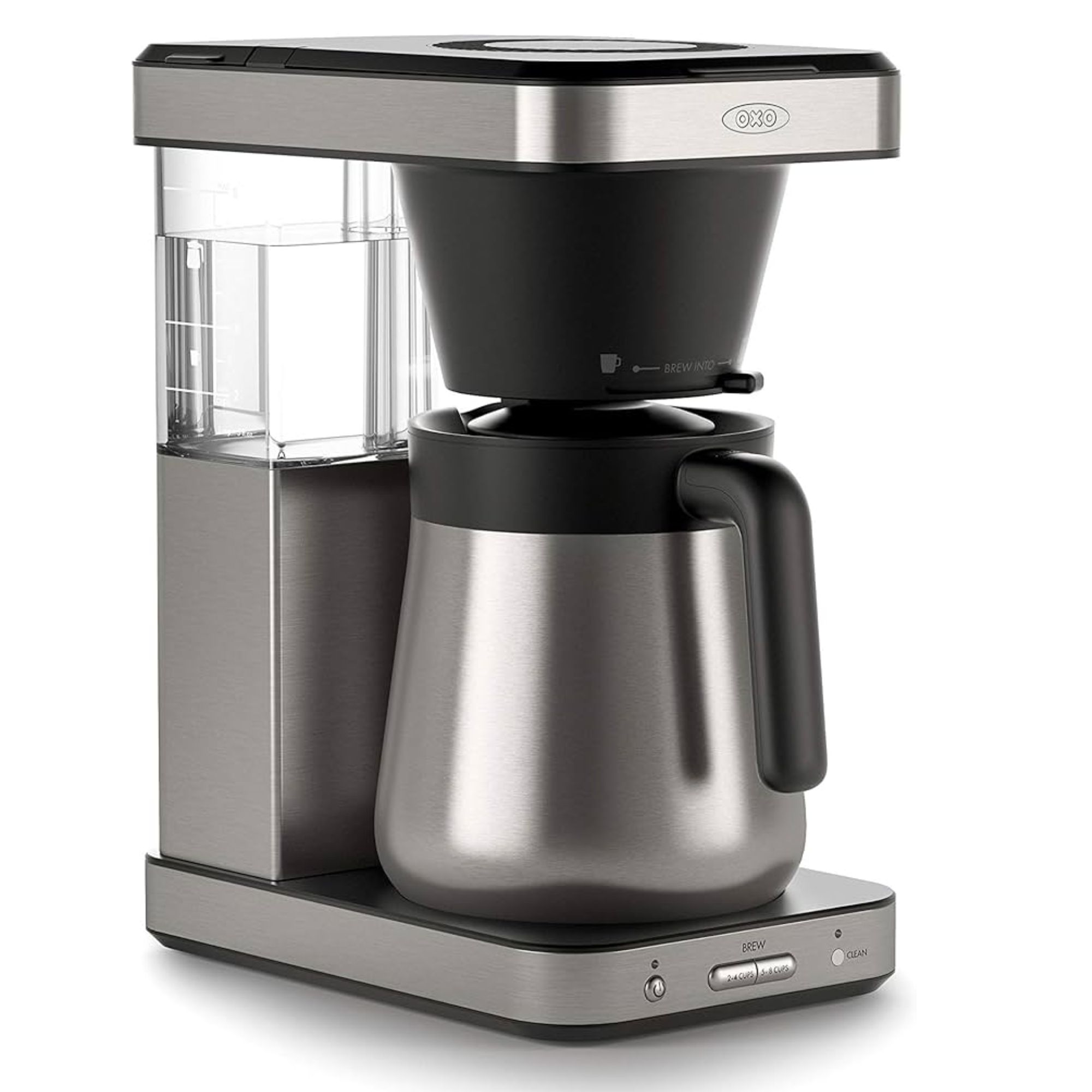
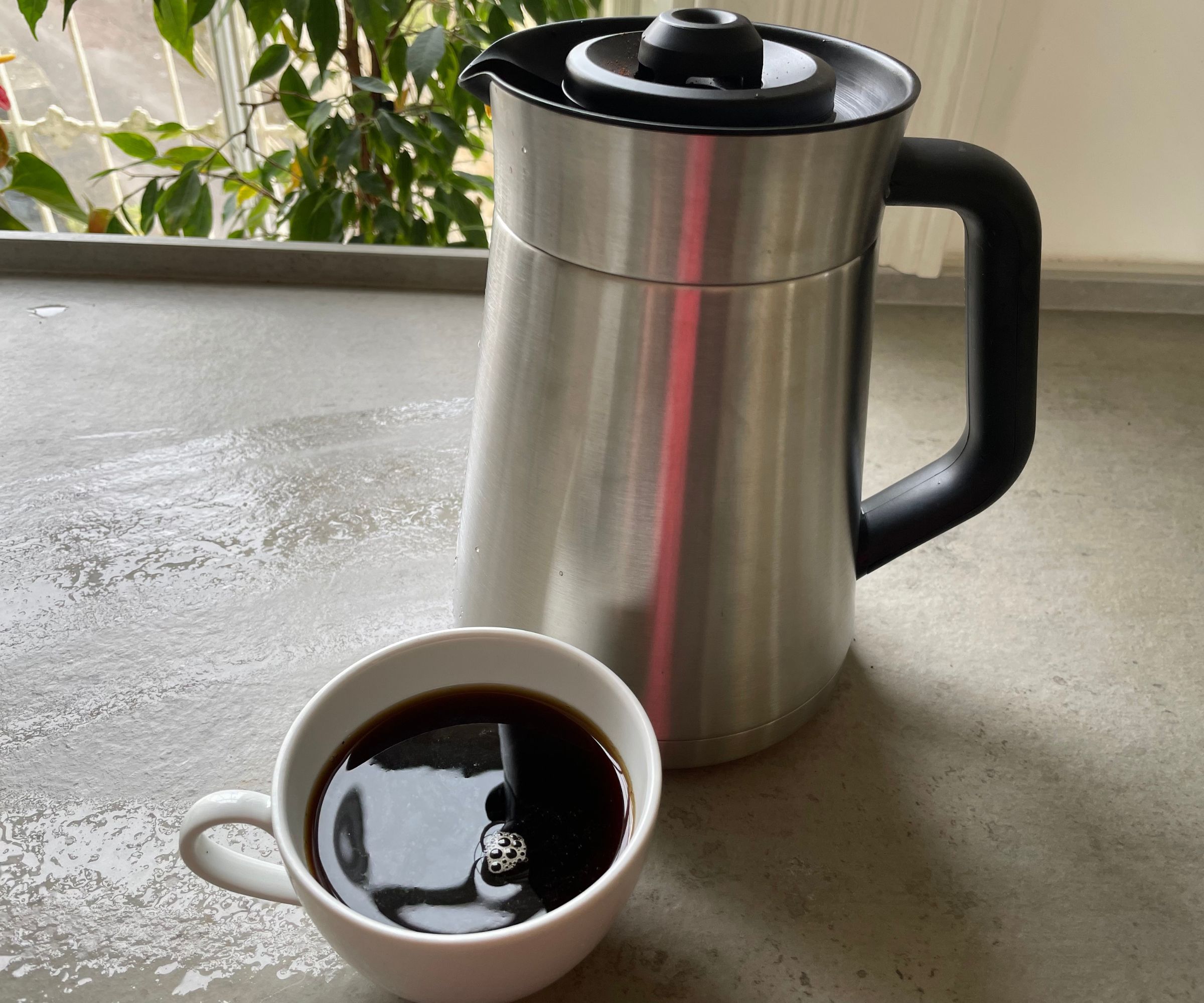
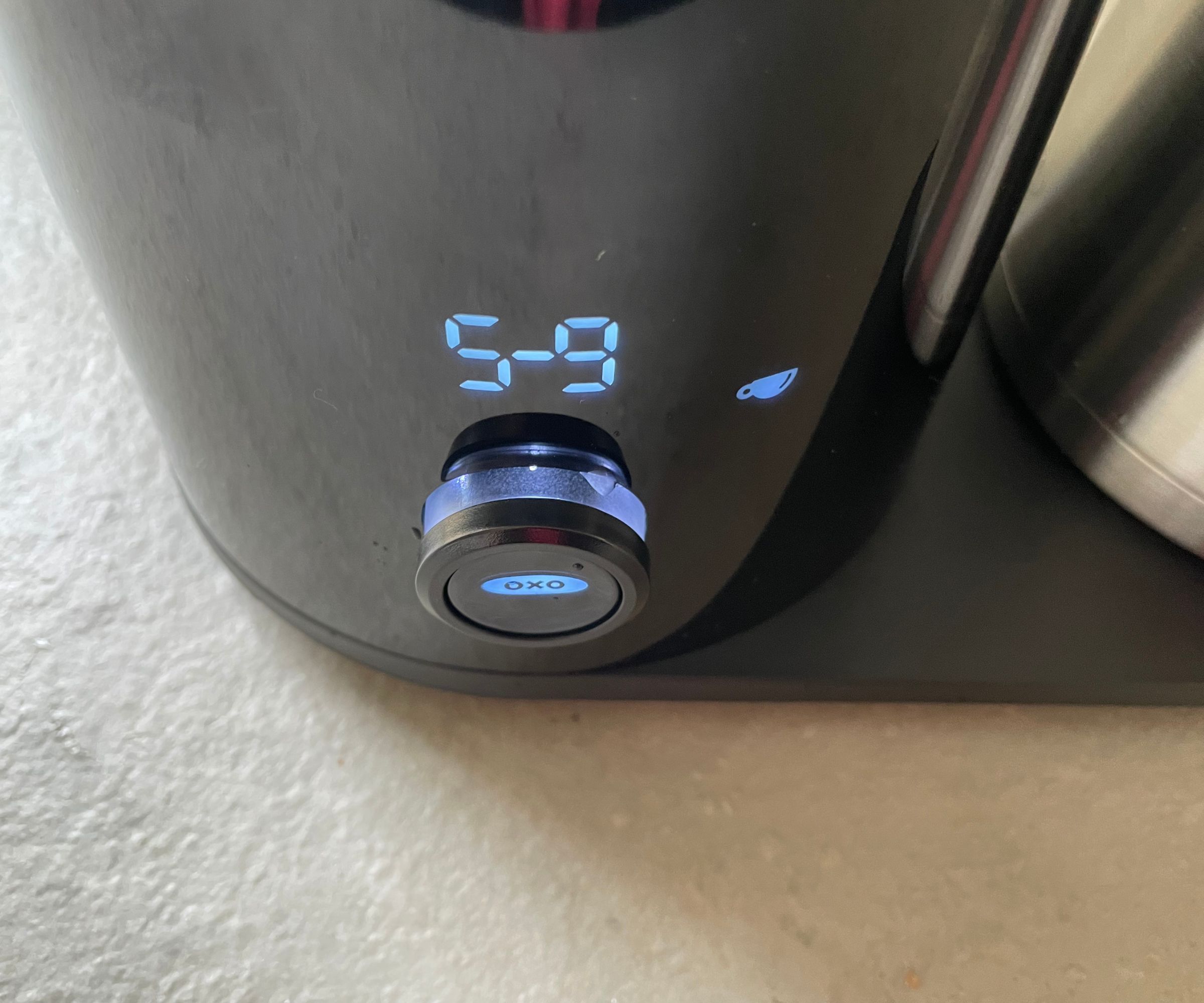
1. OXO 8 Cup Coffee Maker
Specifications
Reasons to buy
Reasons to avoid
The OXO has earned a spot at the top of our buying guide as it hits all our key criteria: it is safe, durable, good value for money and it makes great tasting coffee.
First, the carafe and most of the housing is made from stainless steel, and the heated elements are BPA-free. Second, the taste is excellent. In our tests, it delivered consistently delicious and bold cups of coffee, regardless of the quantity being brewed.
Our tester, Aleenah, awarded it five stars, saying: 'The coffee was delicious and flavorful every time.' She also timed the OXO and it took less than six minutes to brew a full eight-cup carafe of coffee. The double-walled carafe keeps coffee warm and is easy to pour from. If you still need convincing, OXO's 8-Cup Coffee Maker is certified by the Speciality Coffee Association (SCA) for meeting its rigorous home brewing standards.
Even after months of use, Aleenah says the OXO has stayed reliable and easy to use. The only drawback is that it isn’t programmable or customizable. There isn't a built-in clock or automatic mode if you want to brew your coffee at a certain time. Plus, Aleenah said: 'The carafe doesn’t keep the coffee hot for hours, since it has a small hole at the top where stream escapes after brewing.' If that's a priority, you should look at the Aarke model below, which has an excellent hot plate. However, all things considered, the OXO offers solid materials, an excellent cup of coffee, and a good price – which is a rare trio in the world of coffee makers.
You can read more in our full OXO 8-cup coffee maker review
2. Quickest


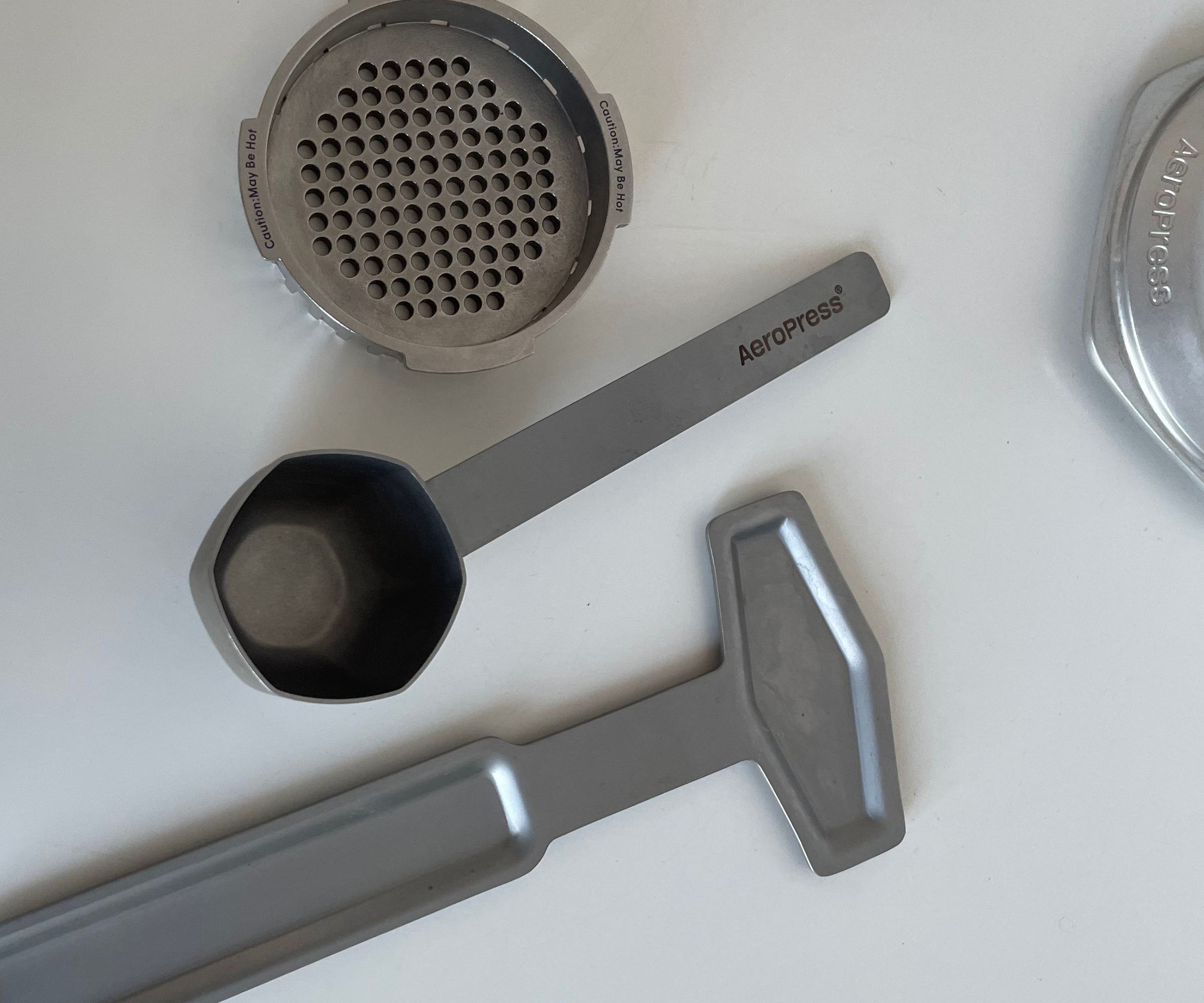
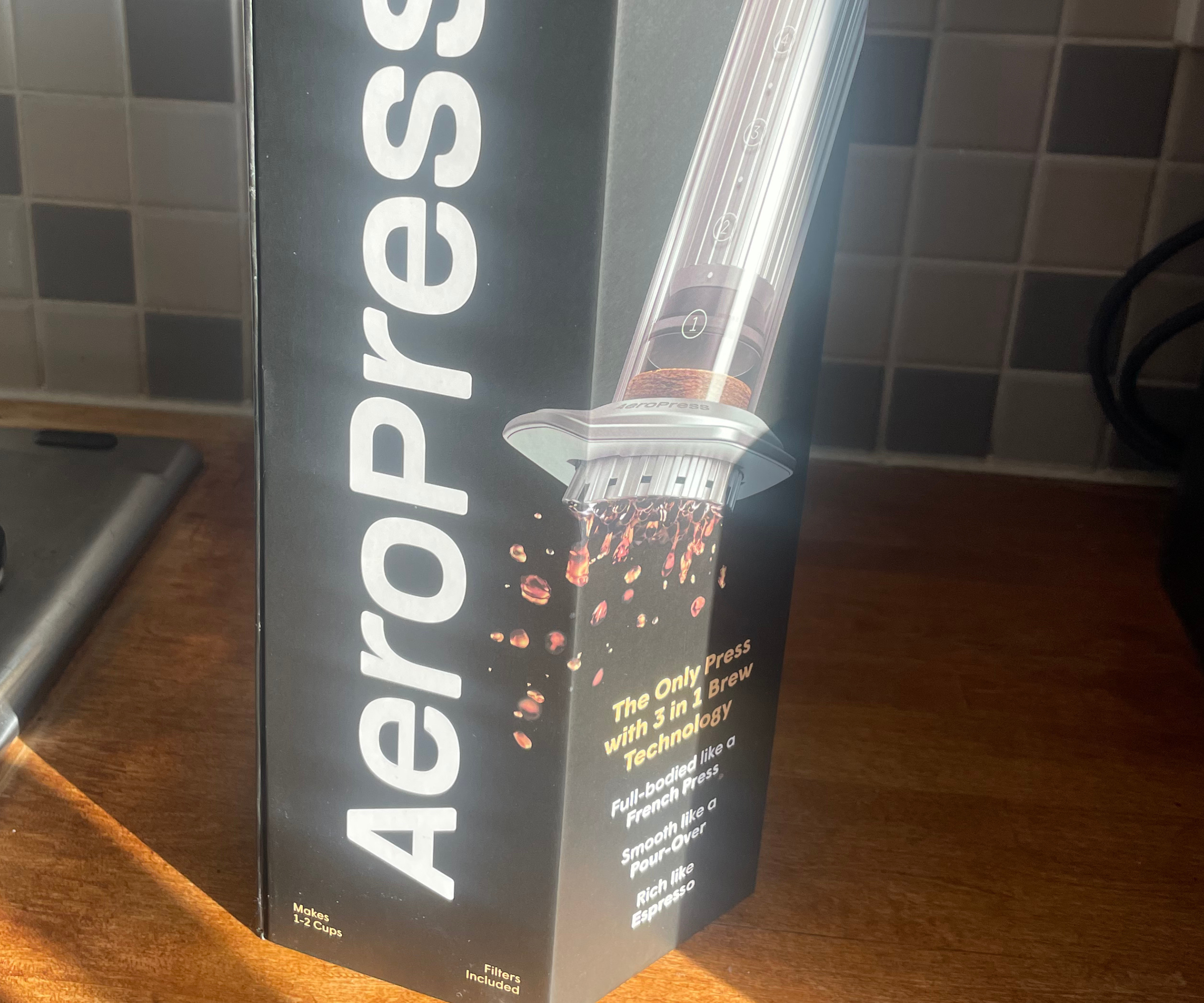
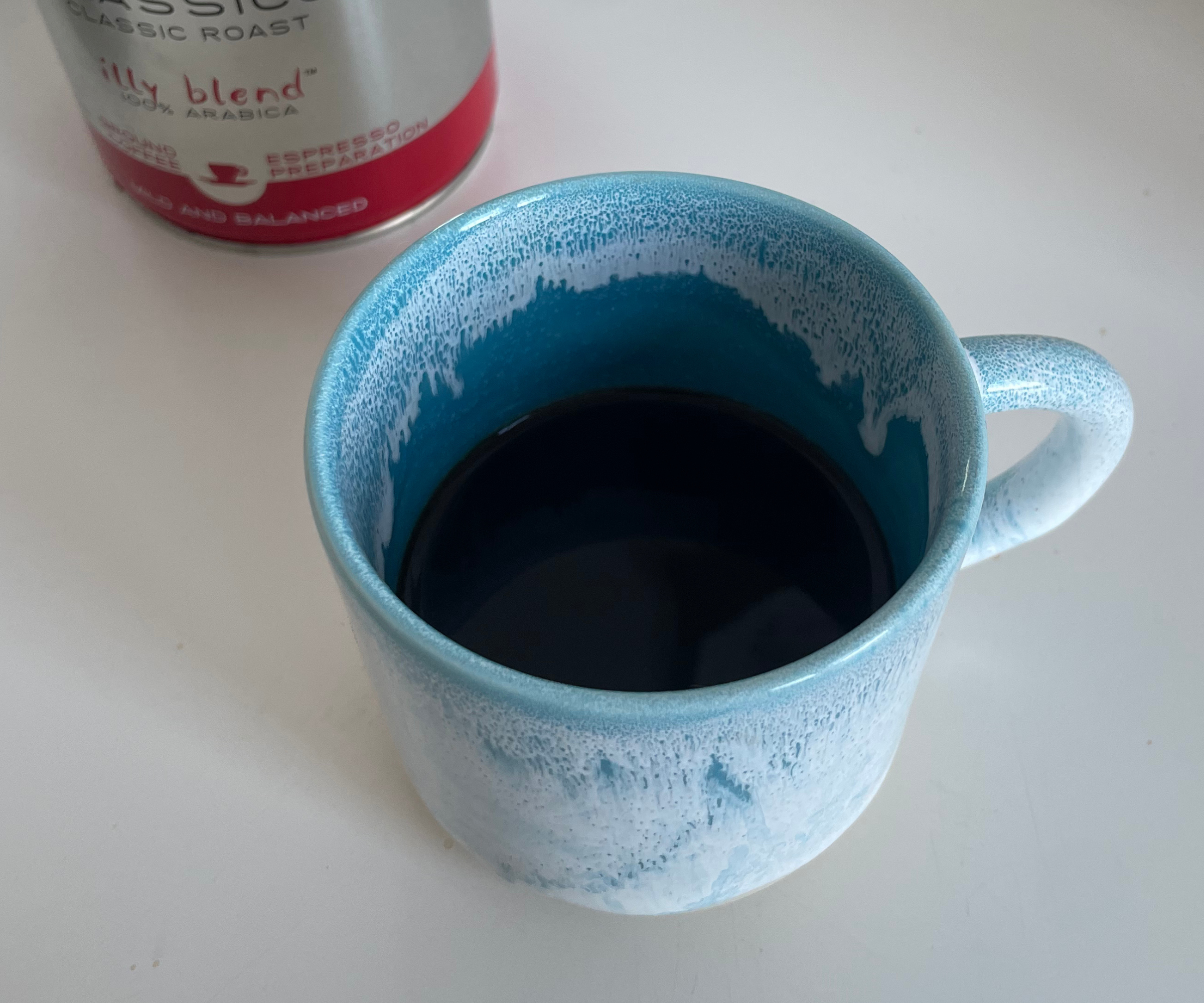
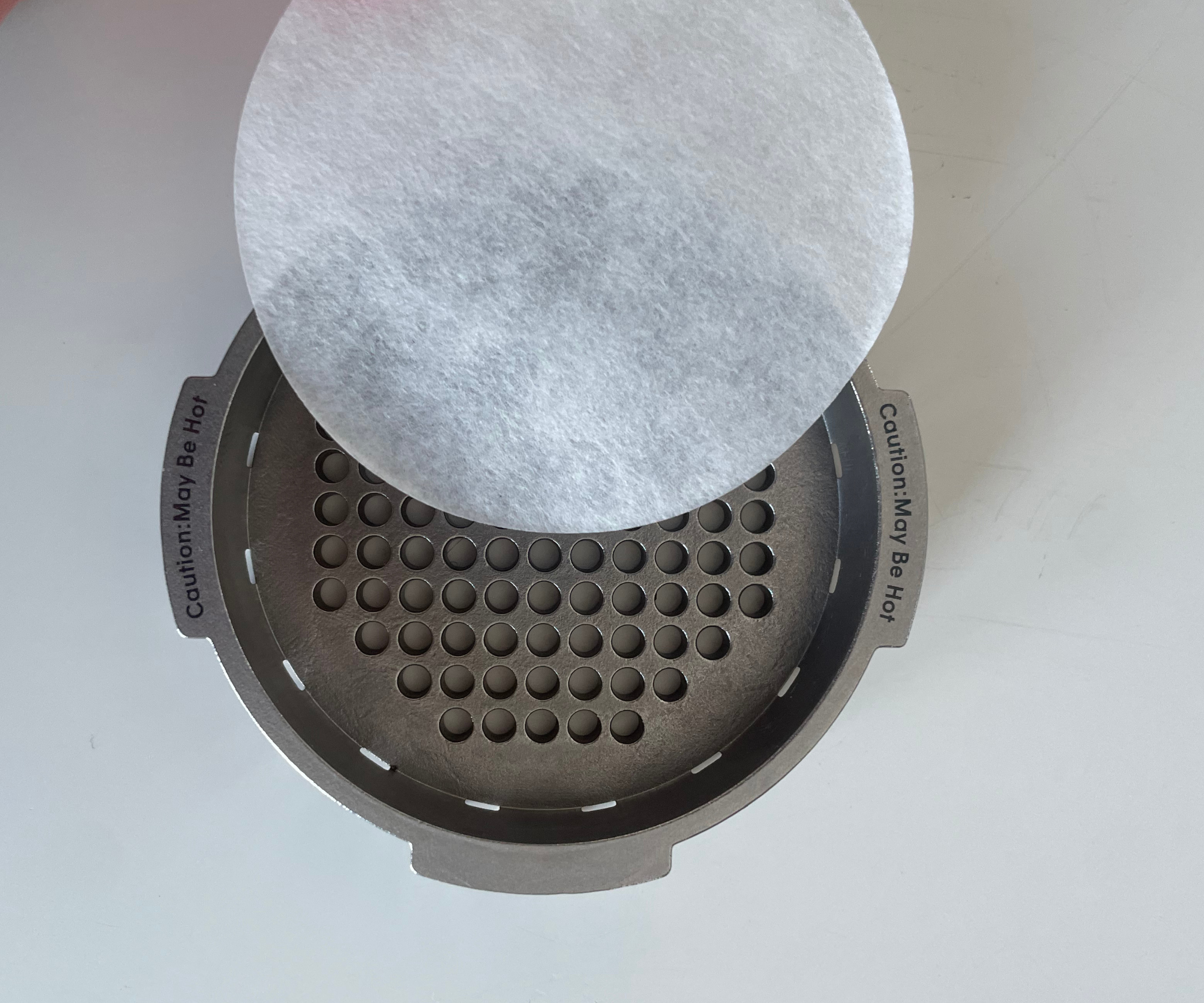
Specifications
Reasons to buy
Reasons to avoid
If you’re ready to ditch those cheap and plasticky pod machines, try upgrading to the Aeropress Premium. The AeroPress brand has long been a favorite among coffee and health enthusiasts (including renowned neuroscientist and podcaster Dr Andrew Huberman). It's perfect for people who prioritize speed, simplicity, and smooth single-serve coffee.
The glass and stainless steel components are sleek and elegant; we were expecting them to feel fragile, but they are sturdy and strong. Setting up was simple. With clear illustrations and straightforward instructions, we were brewing our first cup in minutes. It’s also incredibly quick. We timed the process to be under three minutes from start to finish, including the time it took to boil the kettle.
The included stainless steel filter cap, scoop, and stirrer (all plastic-free!) are very nice to use. The absence of plastic offers peace of mind for those concerned about microplastics and toxins, particularly when using hot water. After brewing, a quick rinse under cold water cools the stainless steel filter, and popping out the coffee puck is a breeze. A rinse and air dry are all that’s needed to have it ready for your next cup. If speed and health are your priority, you'll love the whole experience.
In terms of taste, it brews very smooth, full-bodied coffee. However, it only makes espresso-style shots and americanos for one person, so if you want to serve more people look to the larger OXO 8-cup or Aarke 10 cup models on this list.
Plus, it's pretty expensive. If you want to try the brand for just $30, the Original Aeropress is still a great choice. Instead of glass, it uses BPA-free plastic, which is FDA and EU-approved for coffee contact.
Read more in our full Aeropress Premium review.
3. Best large capacity
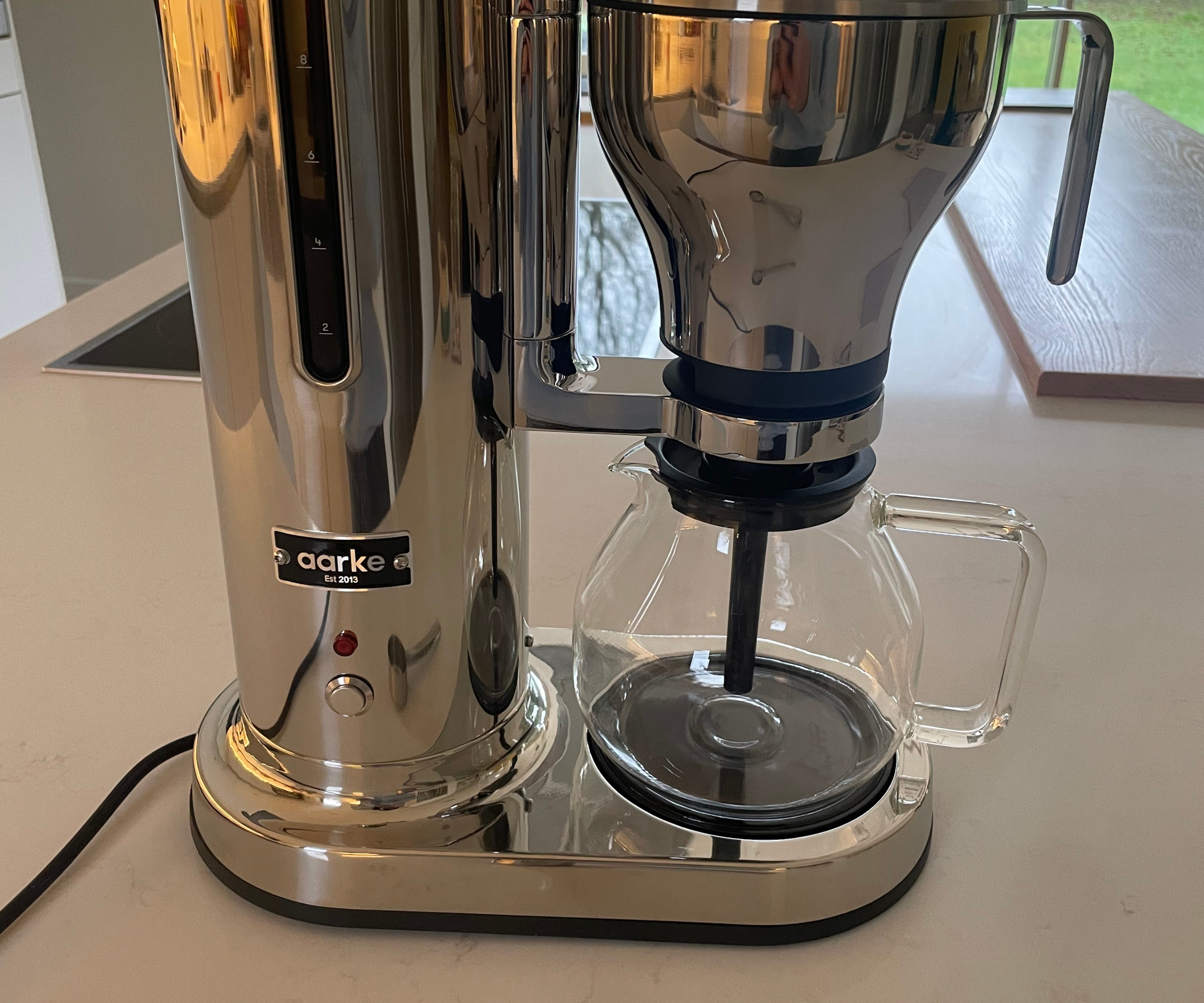
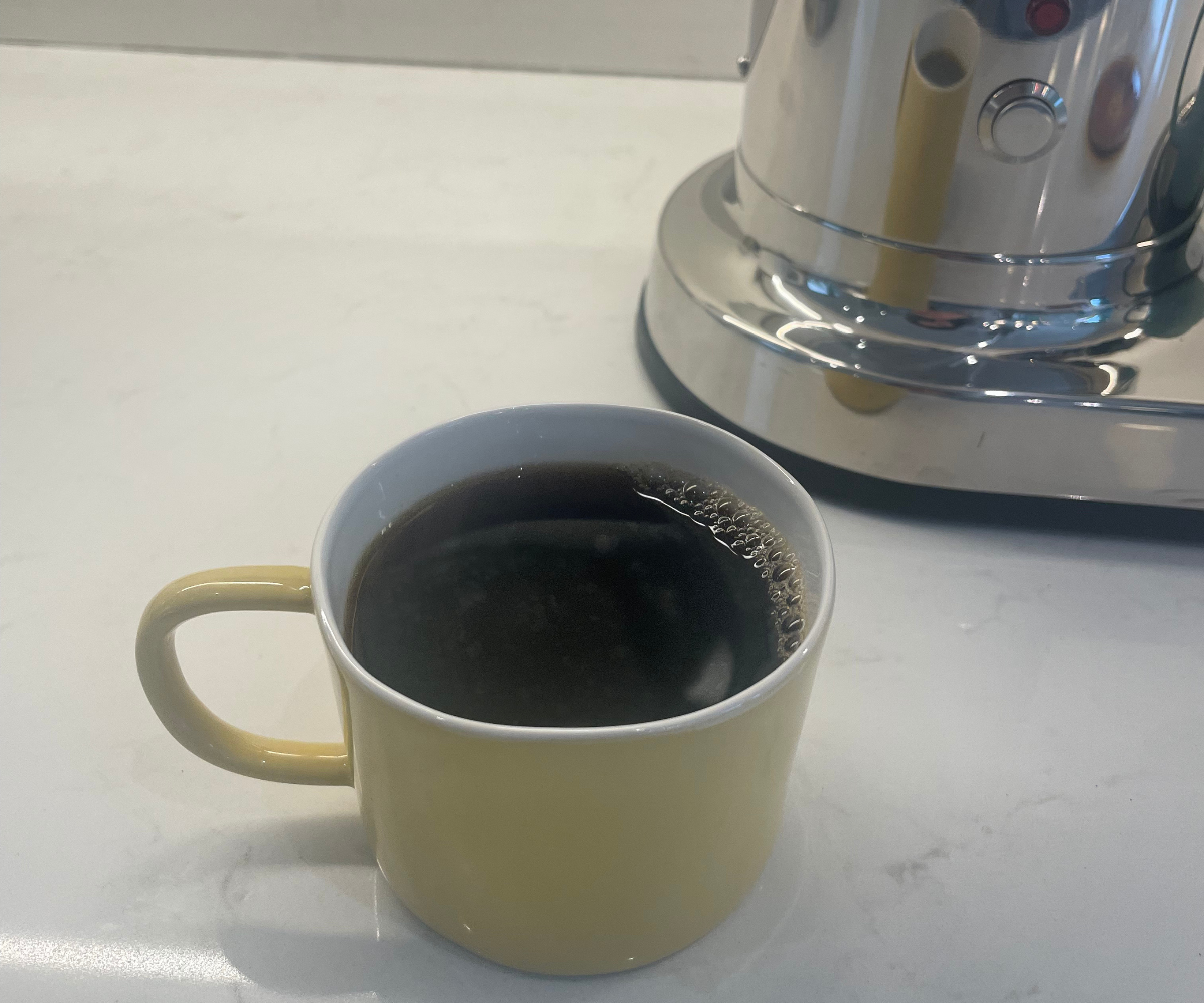
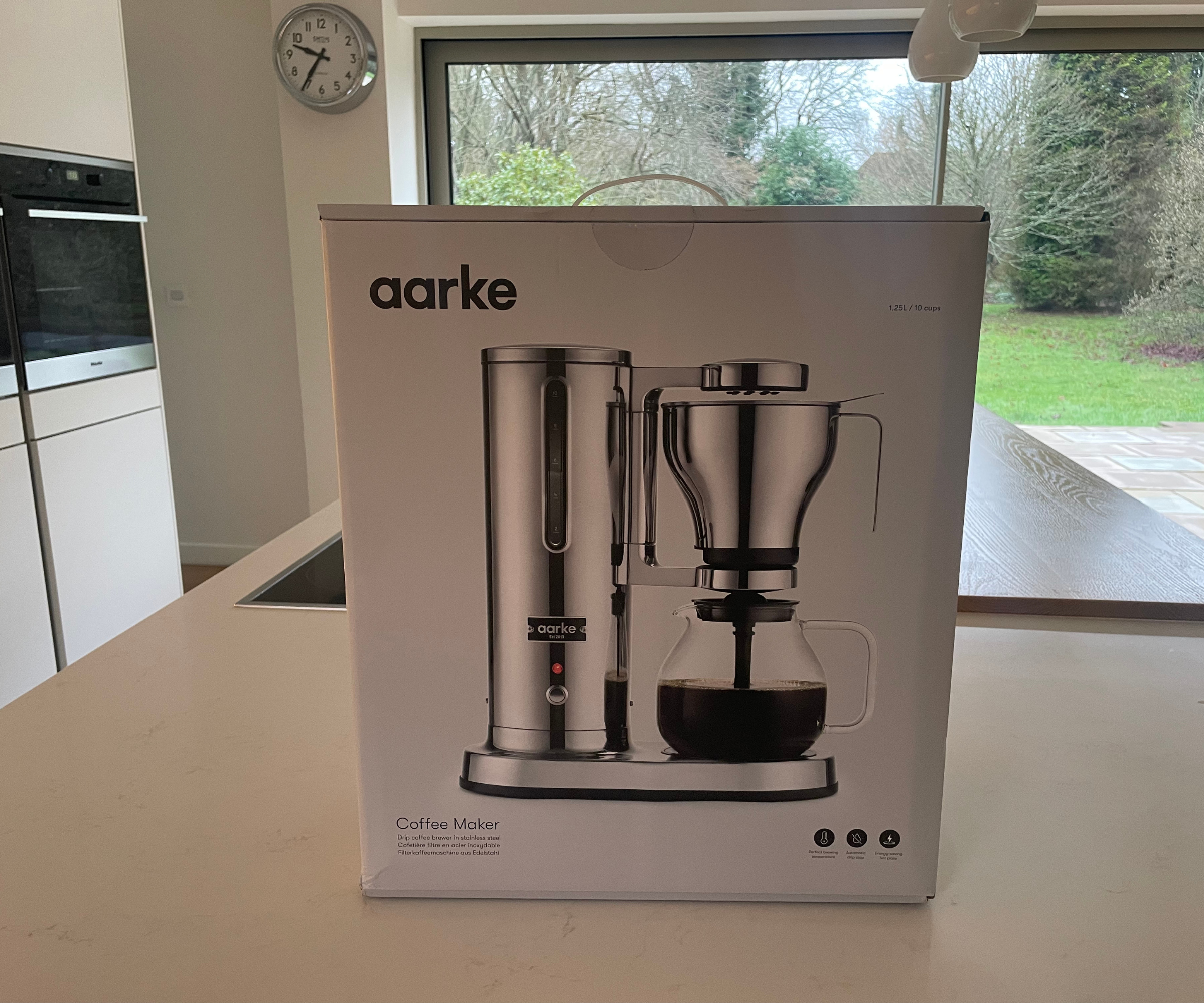
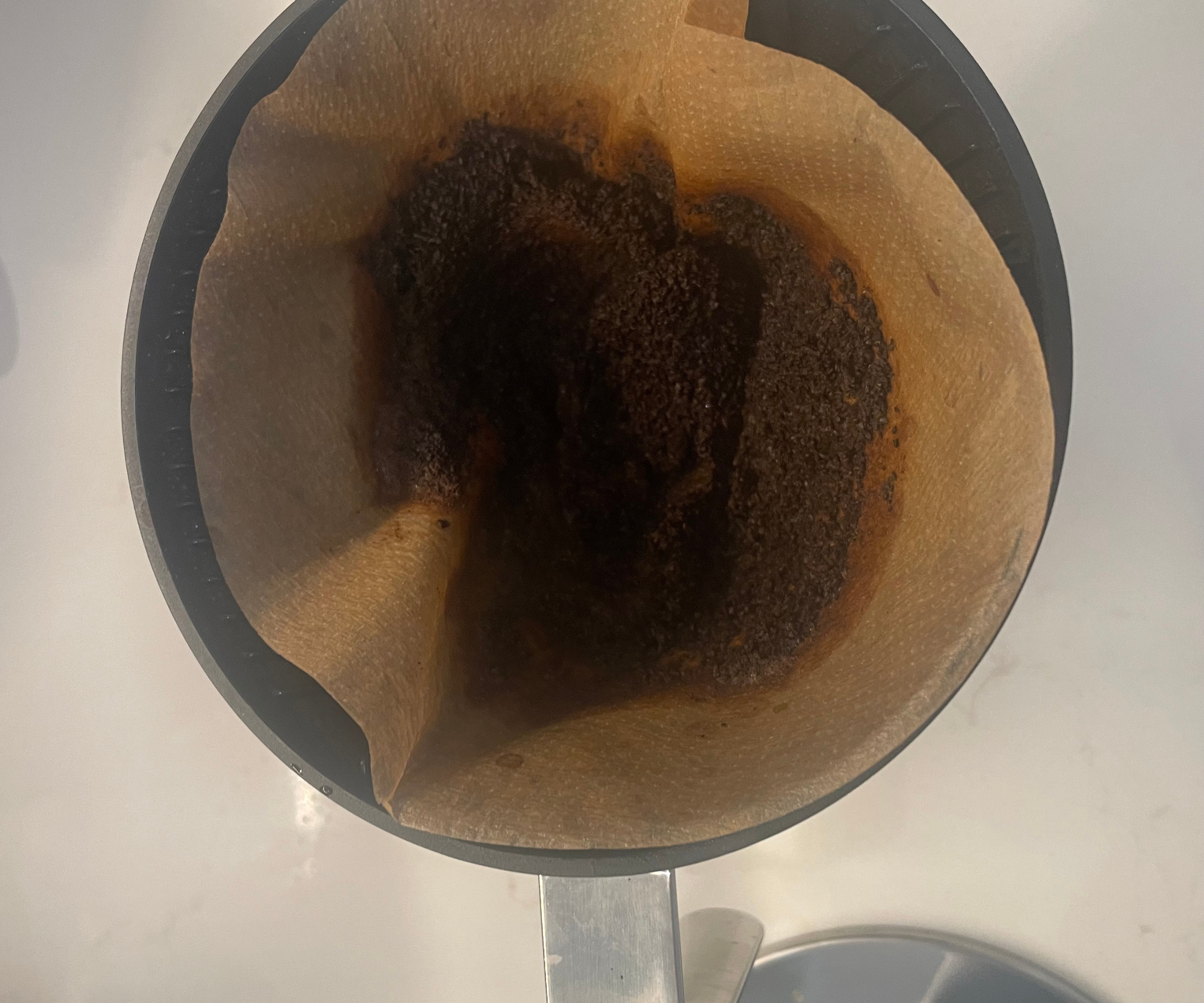
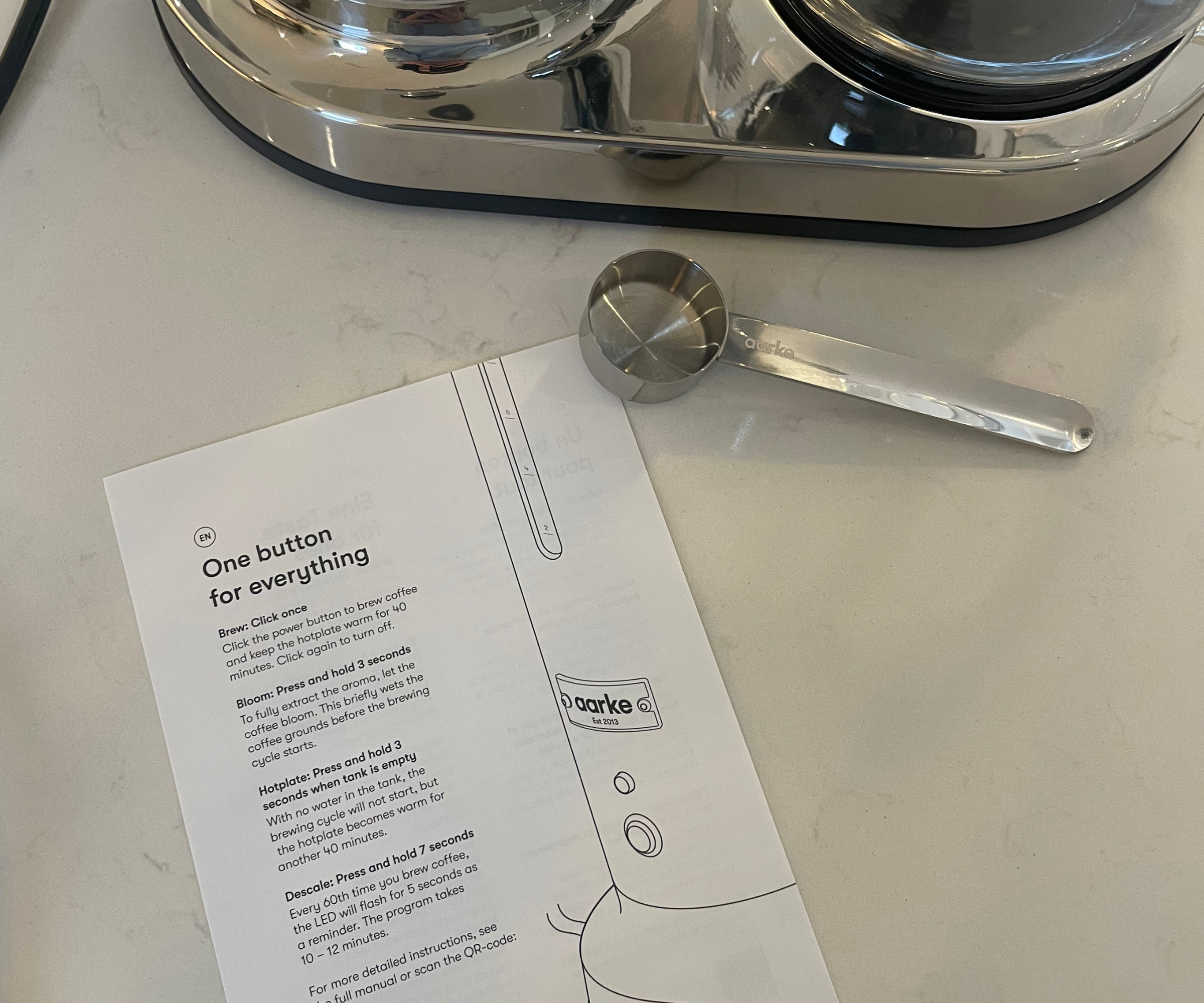
Specifications
Reasons to buy
Reasons to avoid
The Aarke Coffee Maker is large, but it offers a serene, almost meditative brewing experience. Crafted from premium stainless steel and glass, it exudes elegance and durability. While the price is extremely high, the combination of quality materials, large capacity and cup consistency makes it a fantastic addition to any keen host or family's kitchen.
The taste is spot-on, too. On the left, there's a professional-grade boiler with a water sensor to adjust the brewing temperature based on the number of cups being made – ranging from two to ten – so you'll receive optimal flavor extraction no matter how much you're brewing. Aarke promises a full carafe in under six minutes, so you can feed ten people at a breakfast or family gathering. Or, there's a hot plate to keep your coffee warm so you can drink multiple cups throughout the day. These factors combined mean that this model achieves the SCA's Golden Cup standard.
Cleaning the Aarke Drip Coffee Maker is simple. The filter is easy to remove, so you can rinse the cone. The glass carafe is actually dishwasher-safe, but it's very easy to hand-wash and dry as well.
One potential drawback is the sheer size of this machine – it’s a statement piece that will need to remain on the countertop year-round. It might even be too big for your coffee nook or pantry cupboard. If your kitchen space is limited, this should definitely be a consideration. You should also consider the high price tag. It's certainly beautiful, premium, and designed for longevity, but if you're looking for delicious and safe coffee on a budget, you should look to the other models in this guide.
You can read more details in our Aarke Drip Coffee Maker review
4. Most affordable
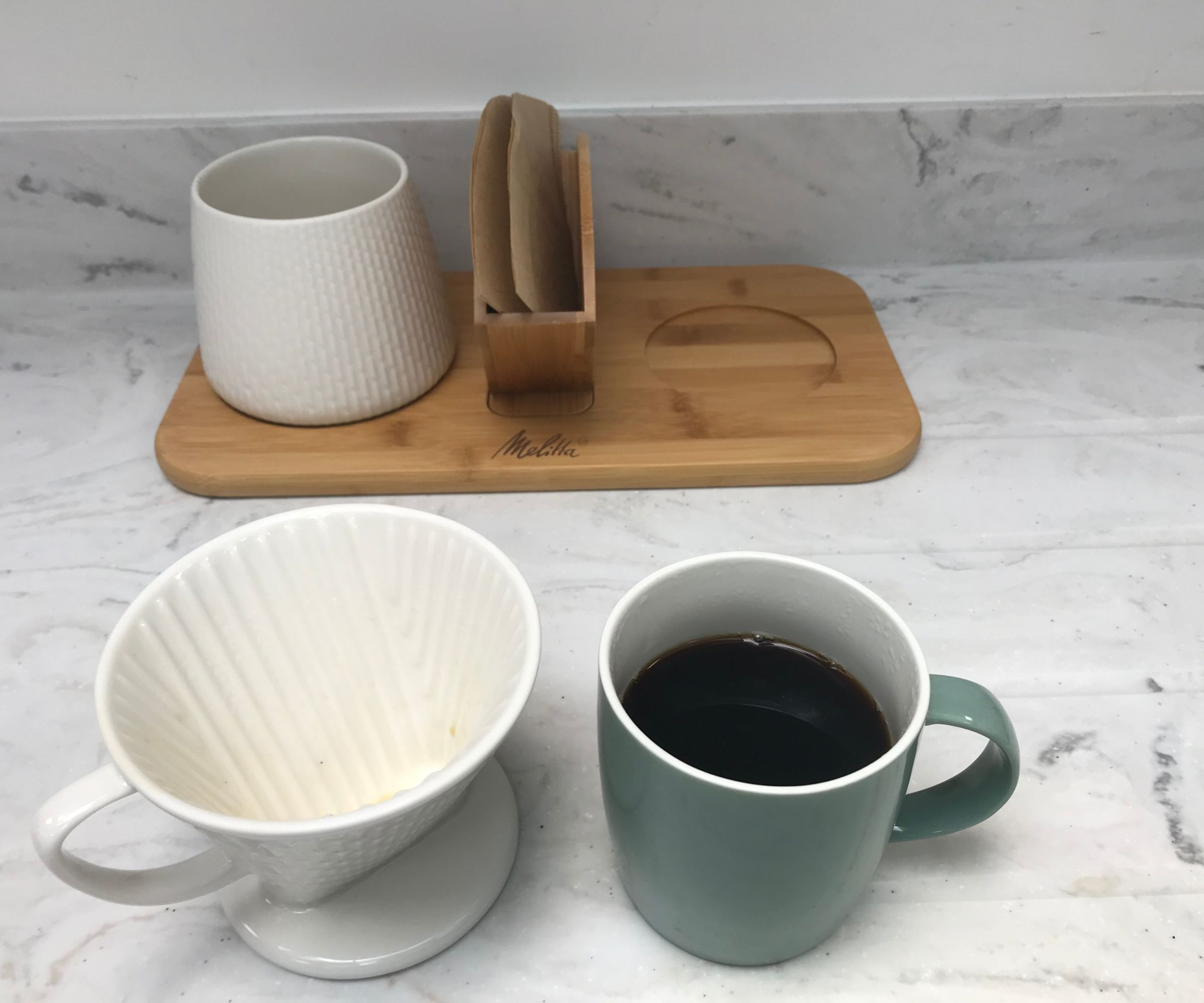
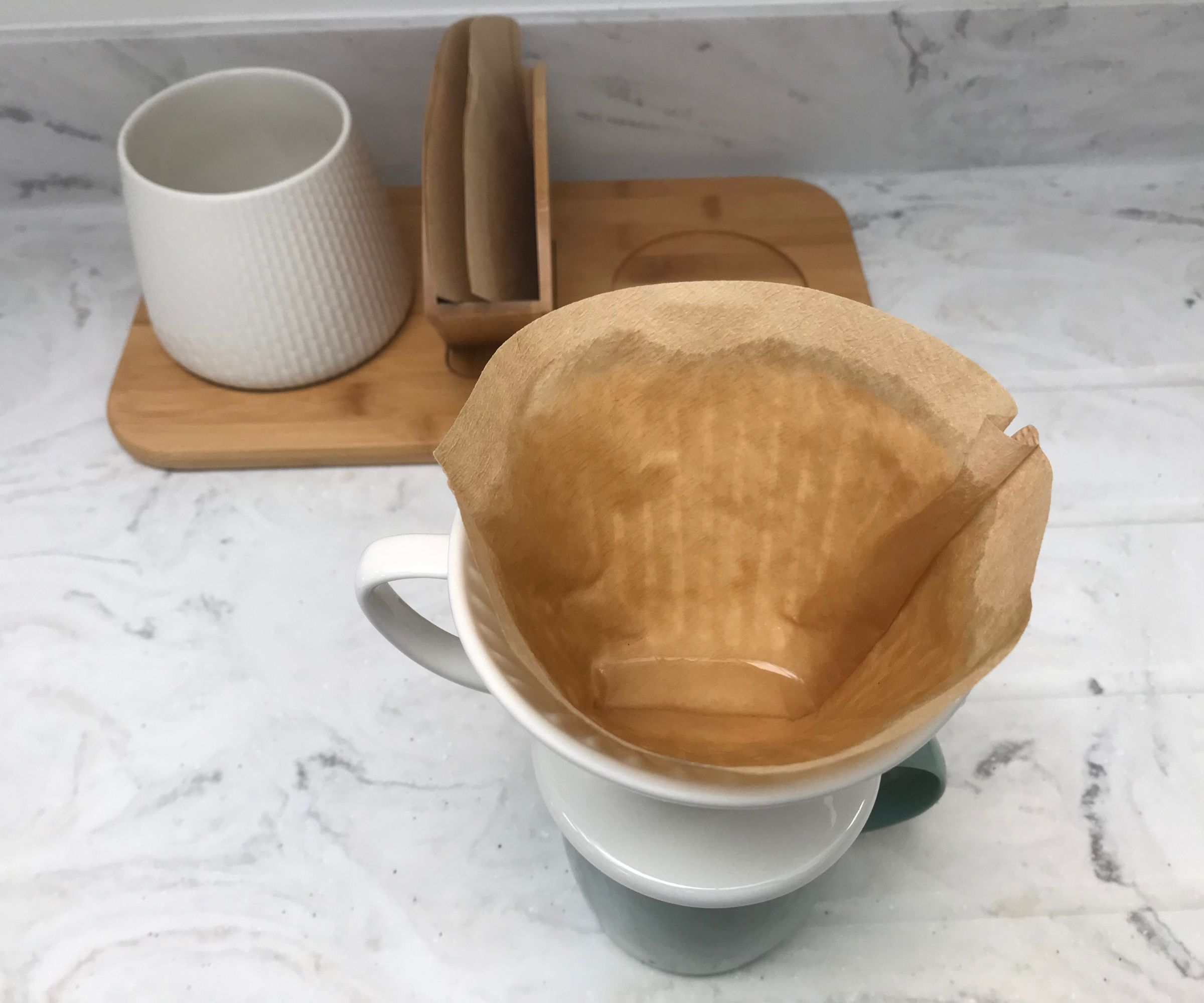
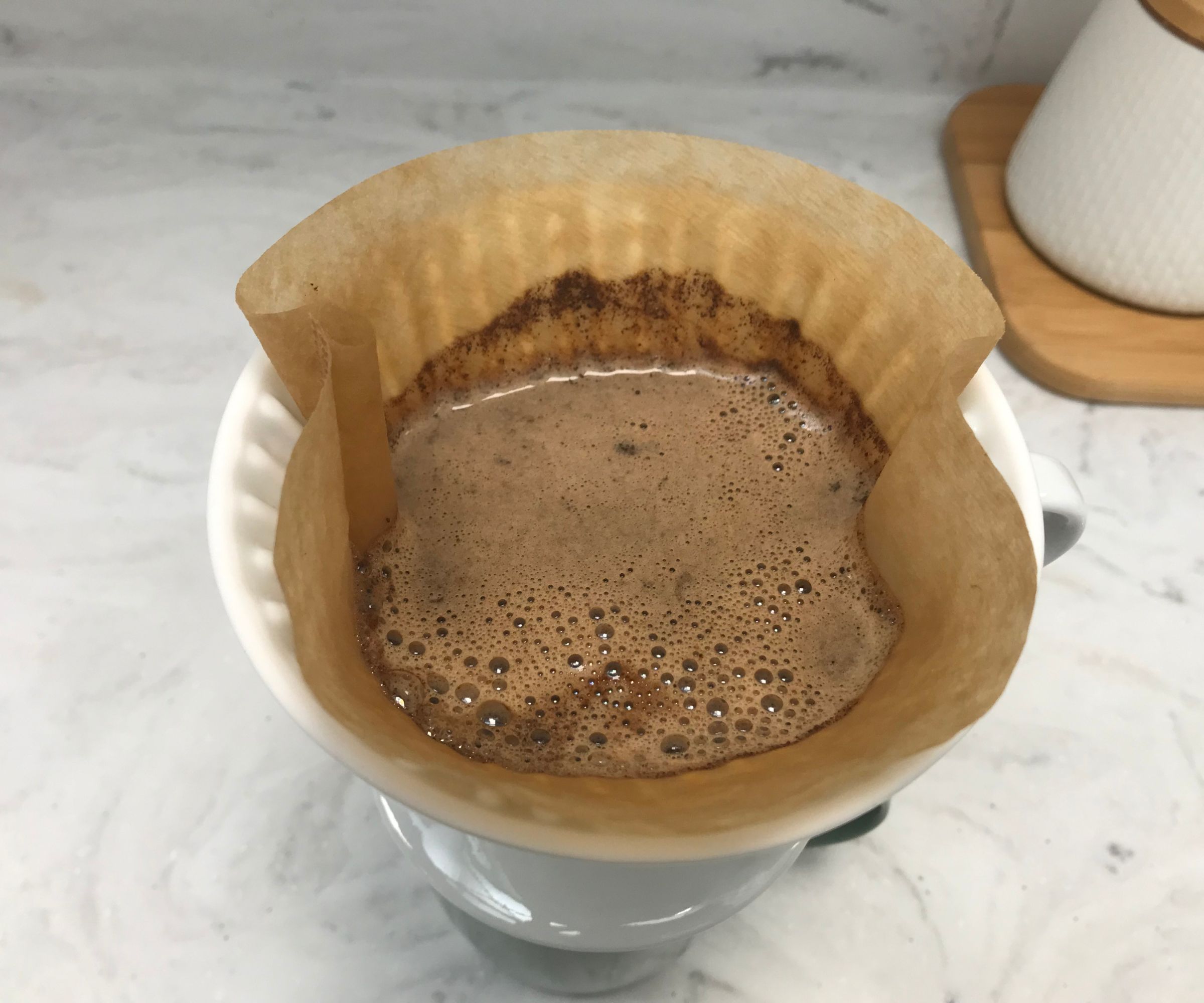
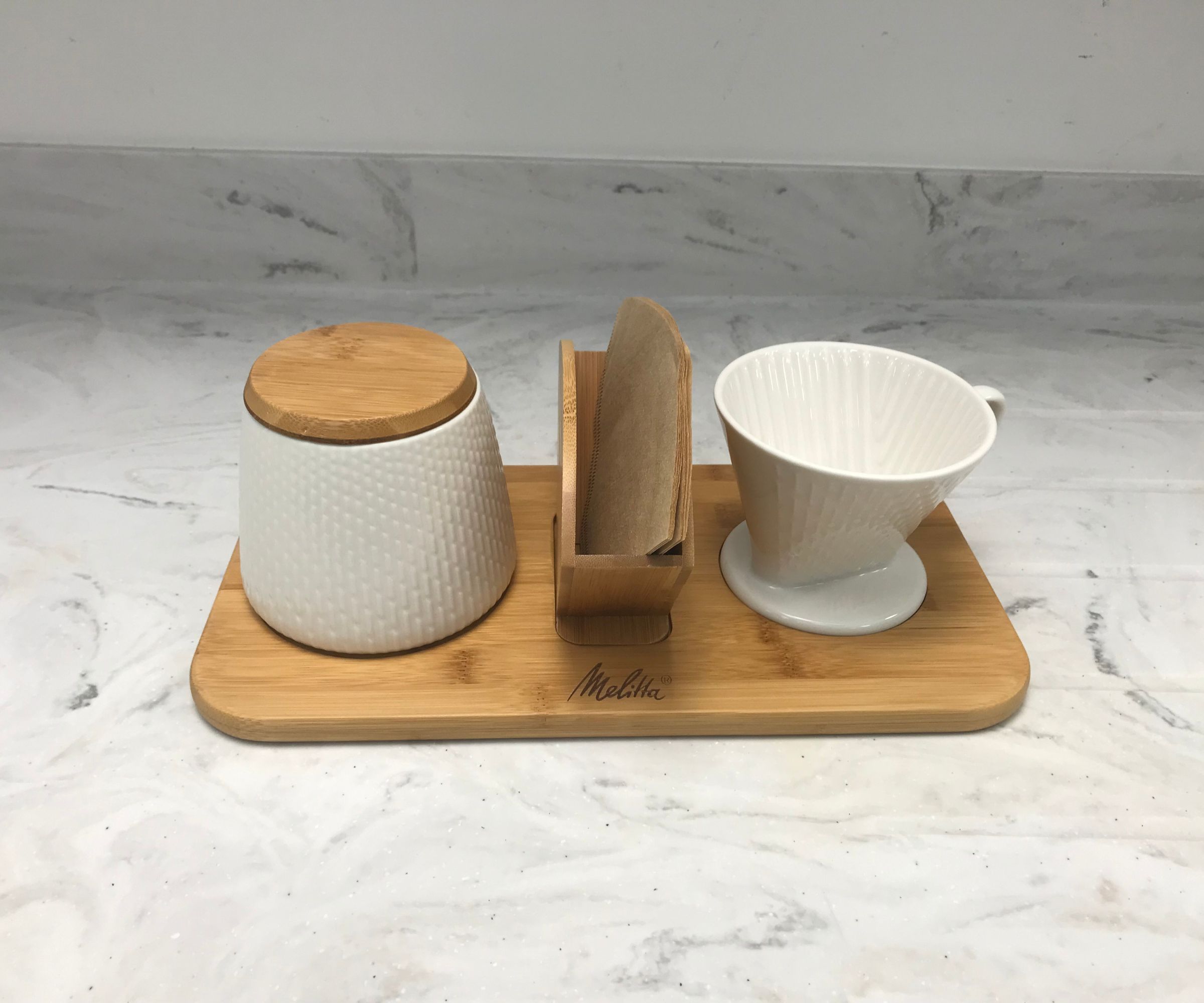
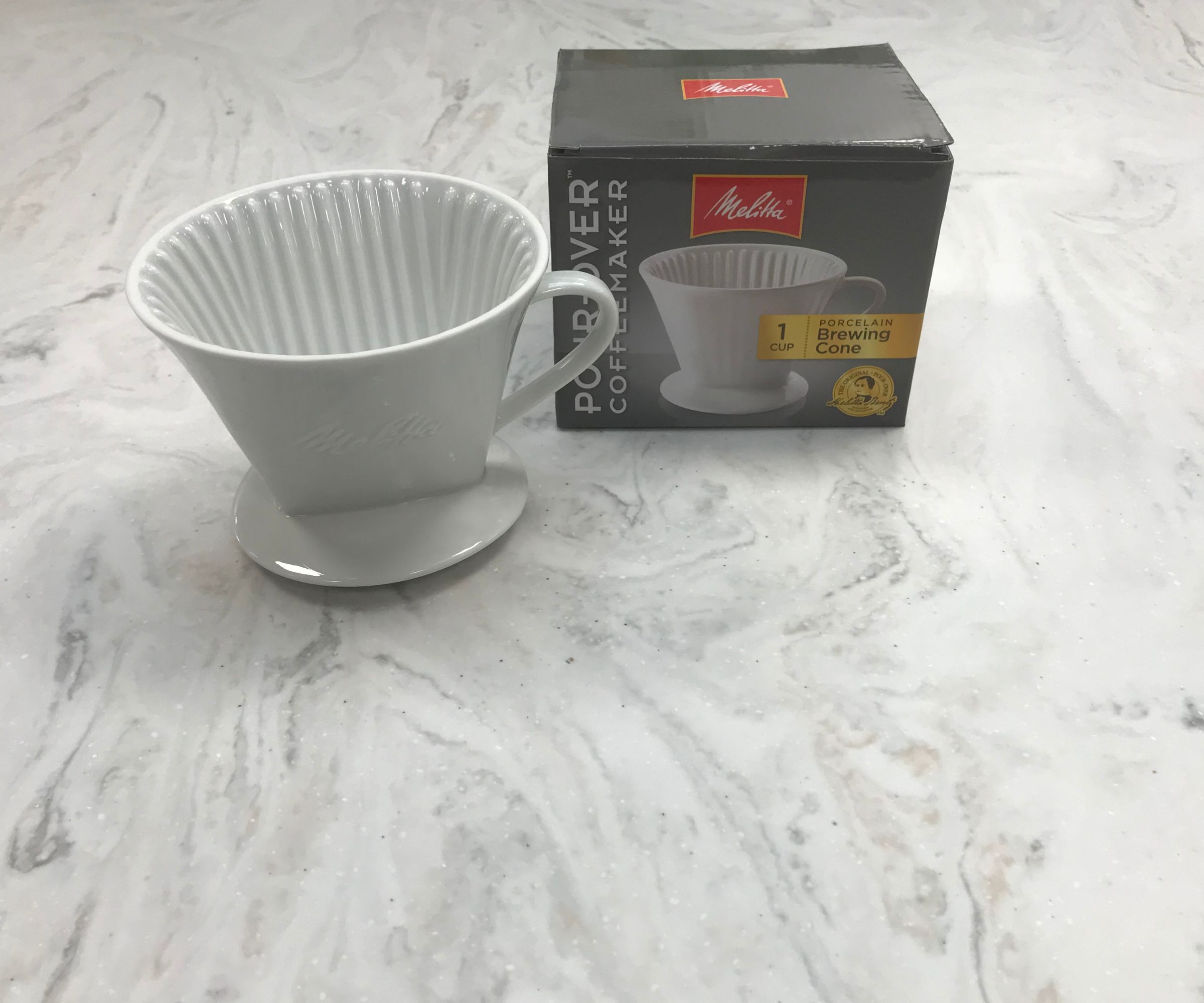
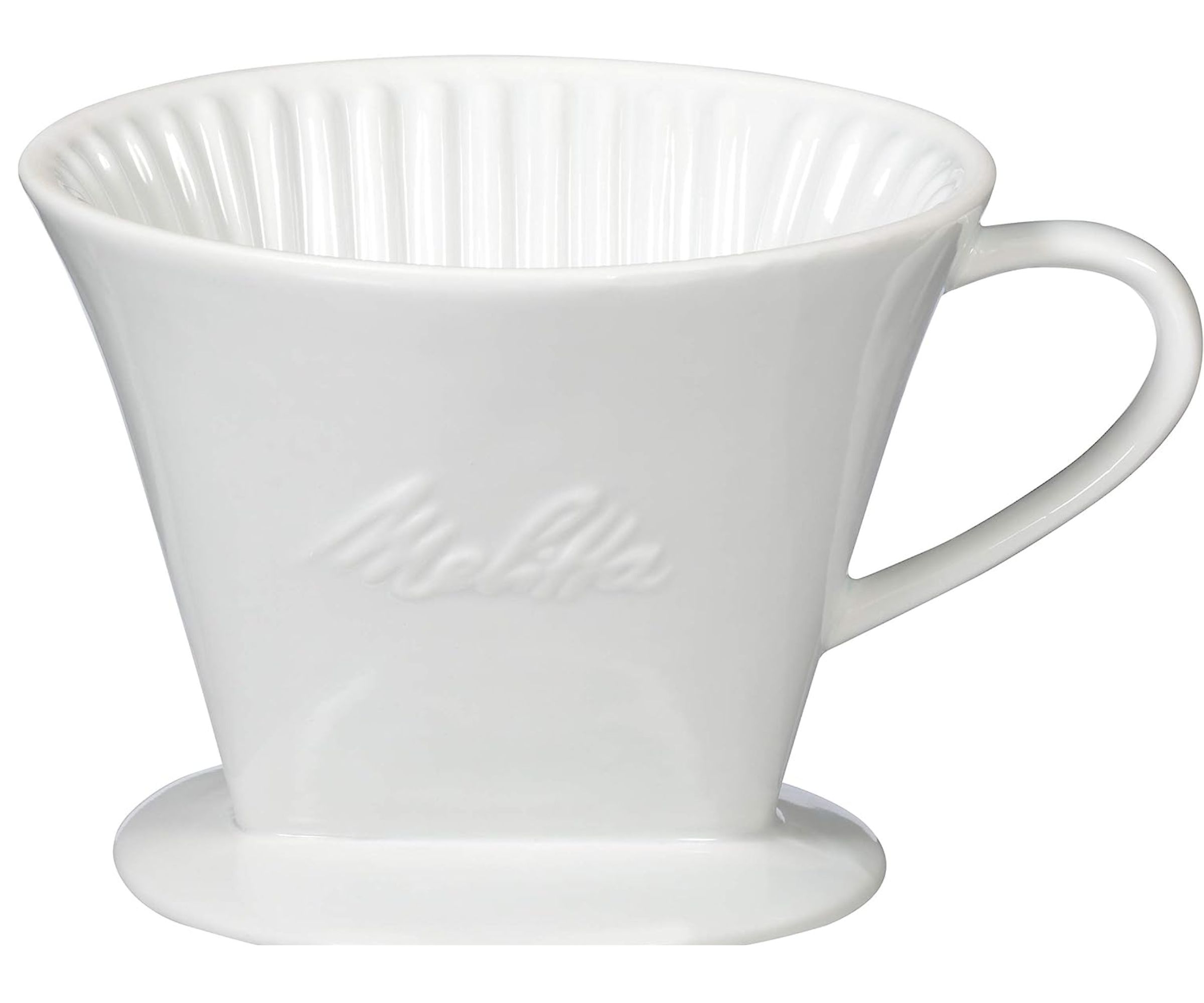
Specifications
Reasons to buy
Reasons to avoid
Retailing for around $15-20, we're not surprised that this is a popular pour-over. It's inexpensive, but our team agree that it feels like a premium product. Our lead tester and ex-barista, Laura, says: 'It looks elegant on the counter and it is made from high-quality porcelain, without any microplastics.'
The Melitta suits a wide range of coffee drinkers, since it makes clean, crisp, and light coffee which suits a lot of people. If you tend to make one coffee at a time, a single-cup pour over is perfect. Plus, it doesn't dominate your kitchen, since it's pretty tiny.
However, it has one drain hole, as opposed to three, so if you aren't a careful pourer, you might over-brew your coffee. Also, if you're in a hurry and you need to batch brew more coffee, this will take too long, because you need to pour your water over the coffee very specifically – and of course, you can only brew one cup at a time.
If you need to brew a batch for a crowd, we think you'll prefer the drip coffee options on this list, like the OXO 8-Cup or the more premium Aarke. However, if your only goal is that you simply don't want to spend a fortune on a non-toxic coffee maker, the Melitta is a winner.
You can read more details in our Melitta Pour Over review
5. Best for travel

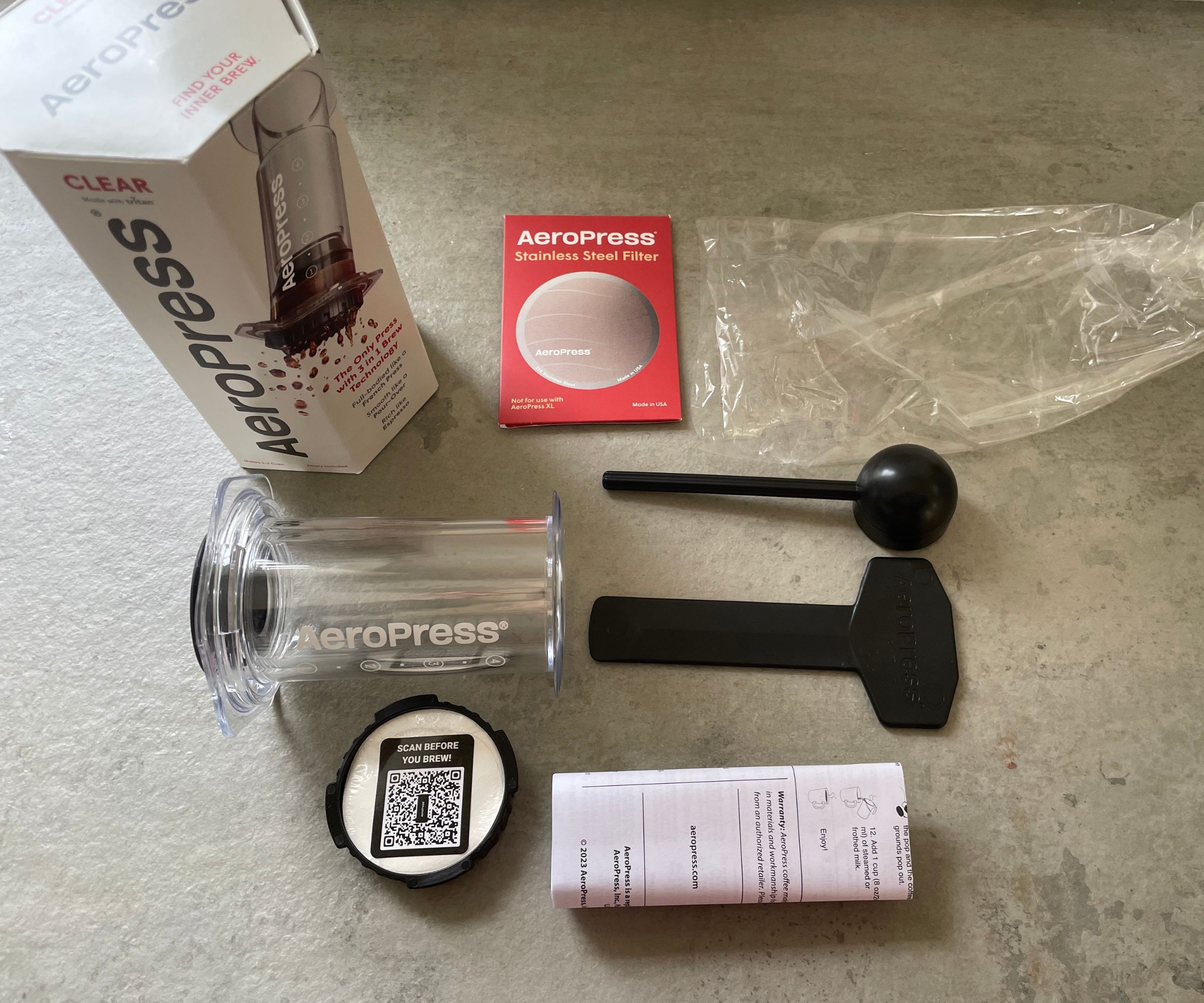
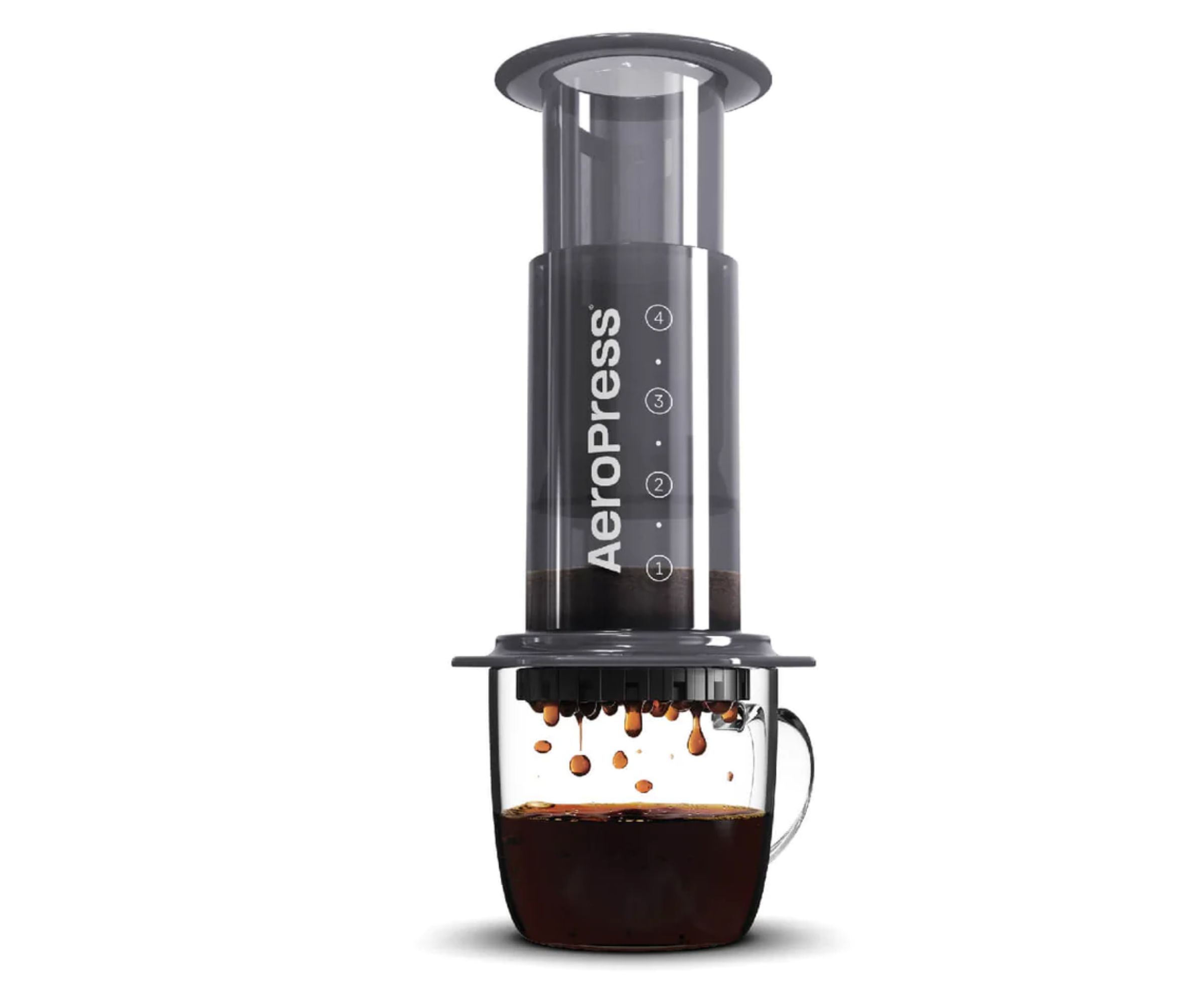
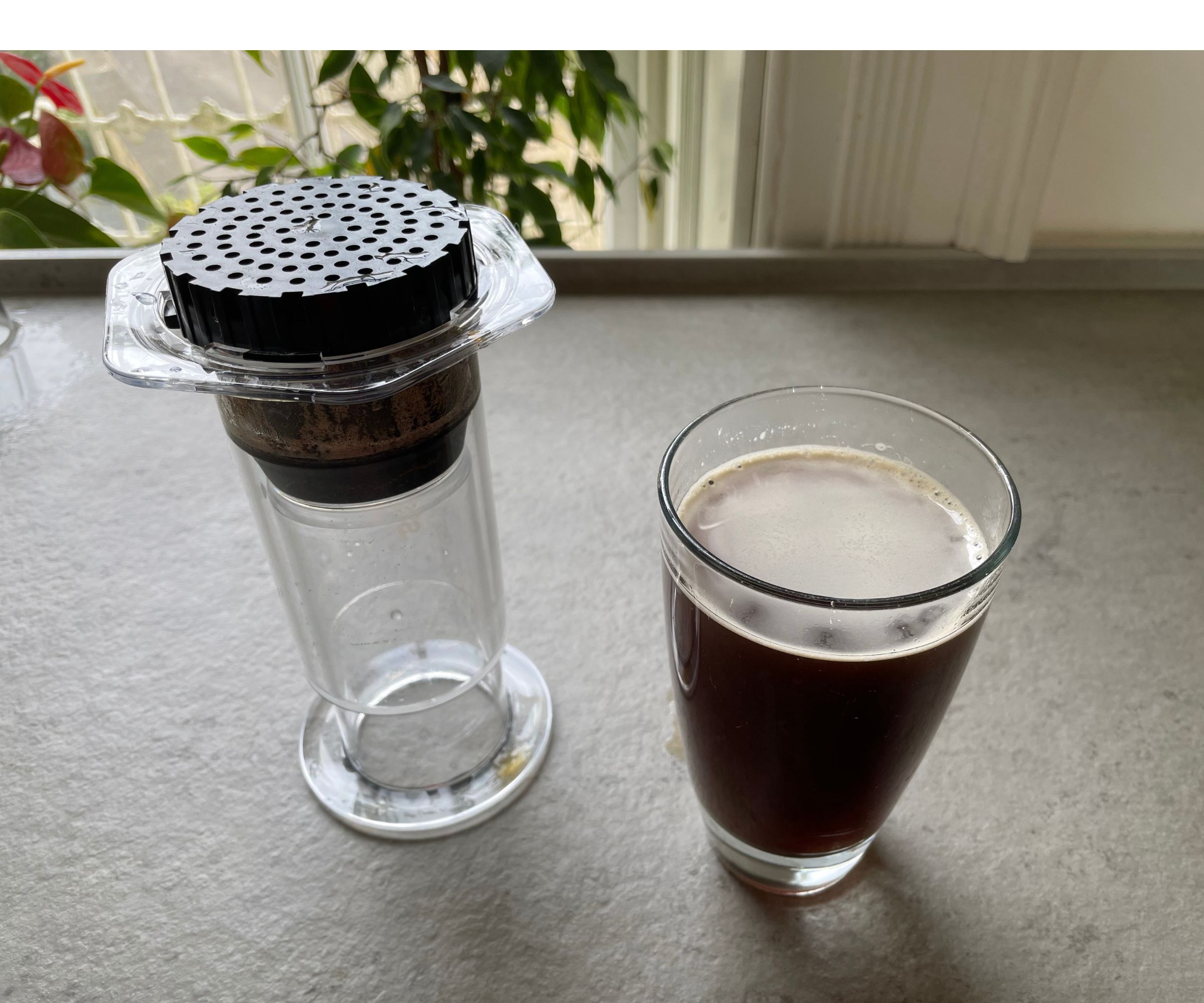
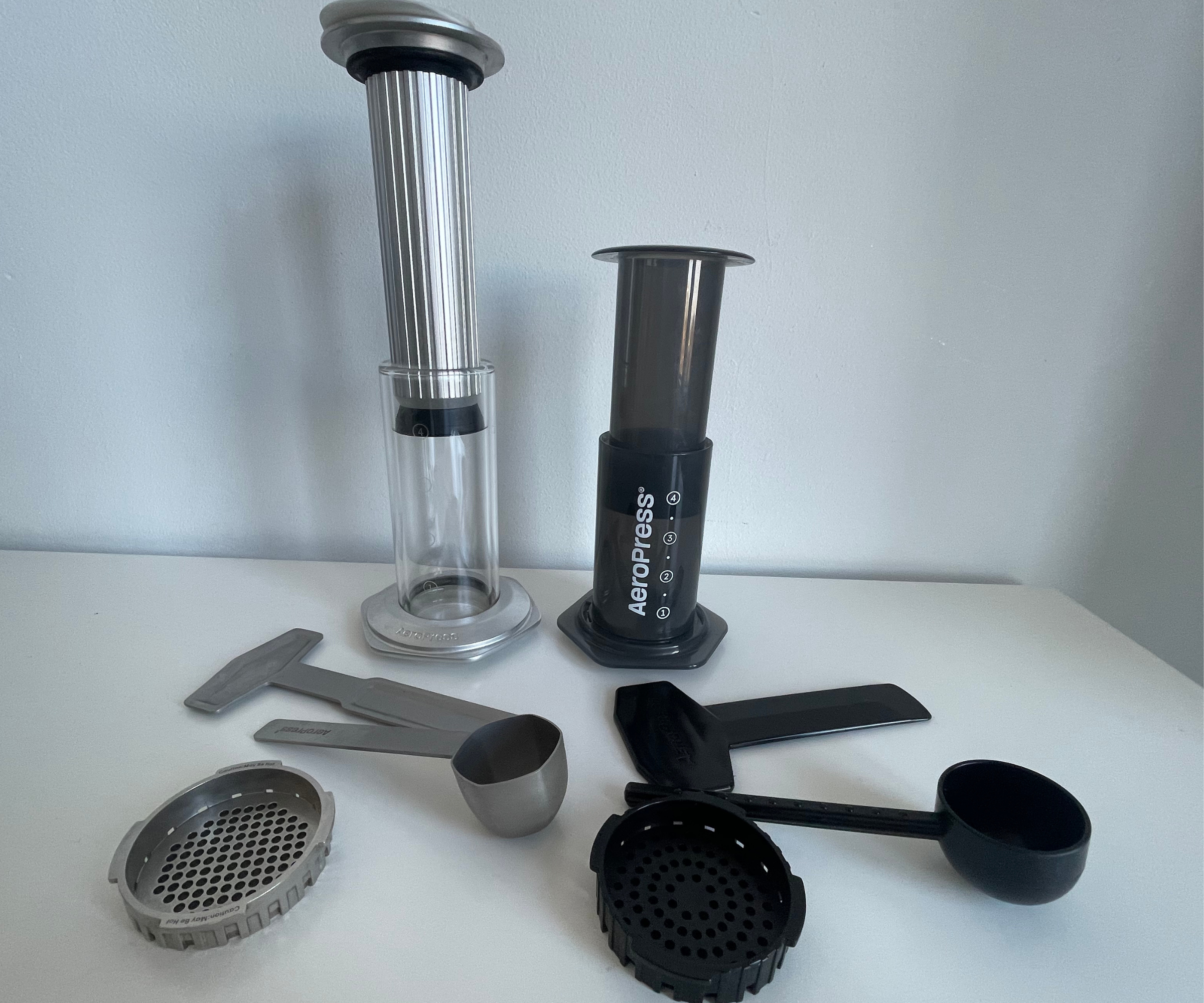
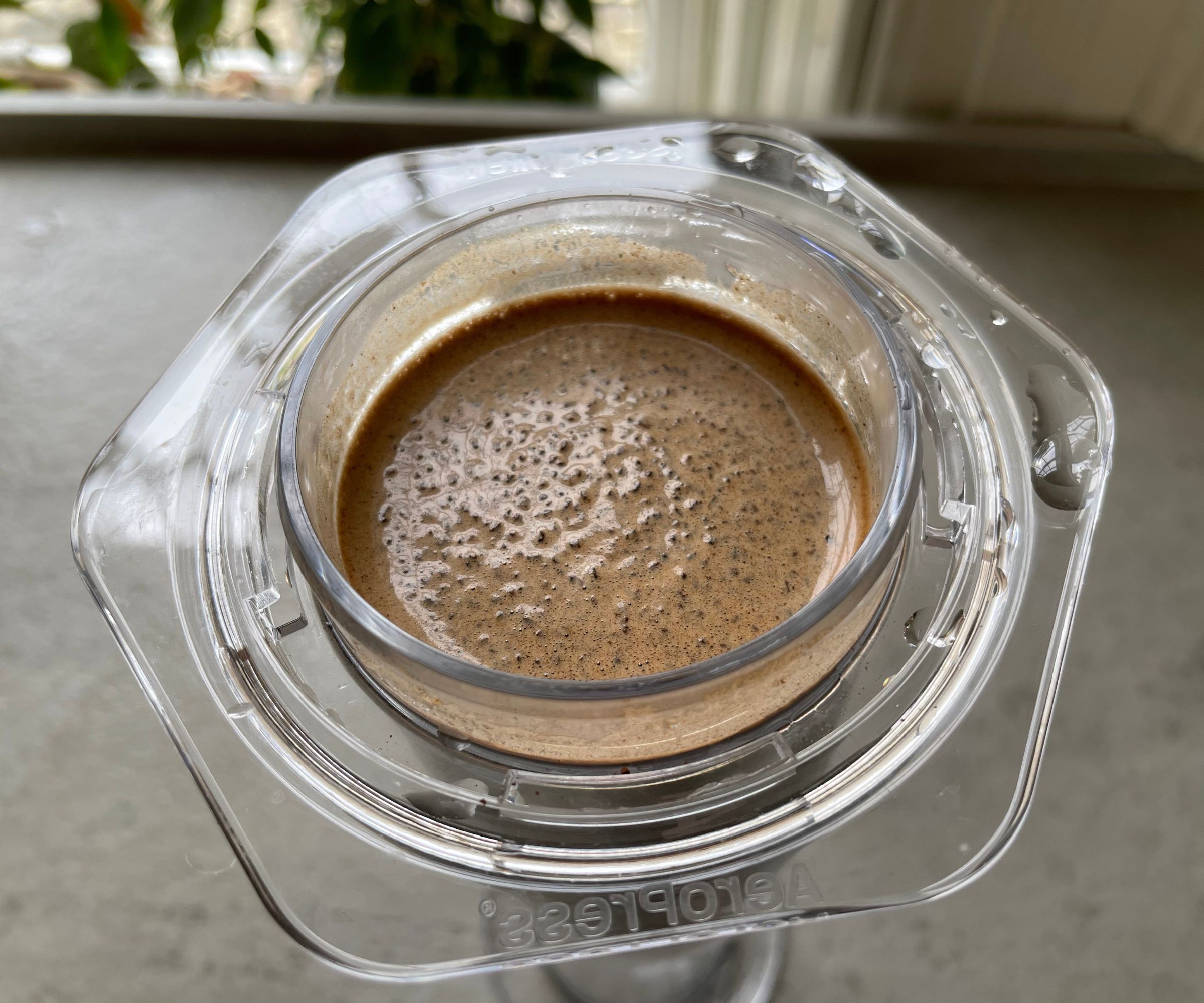
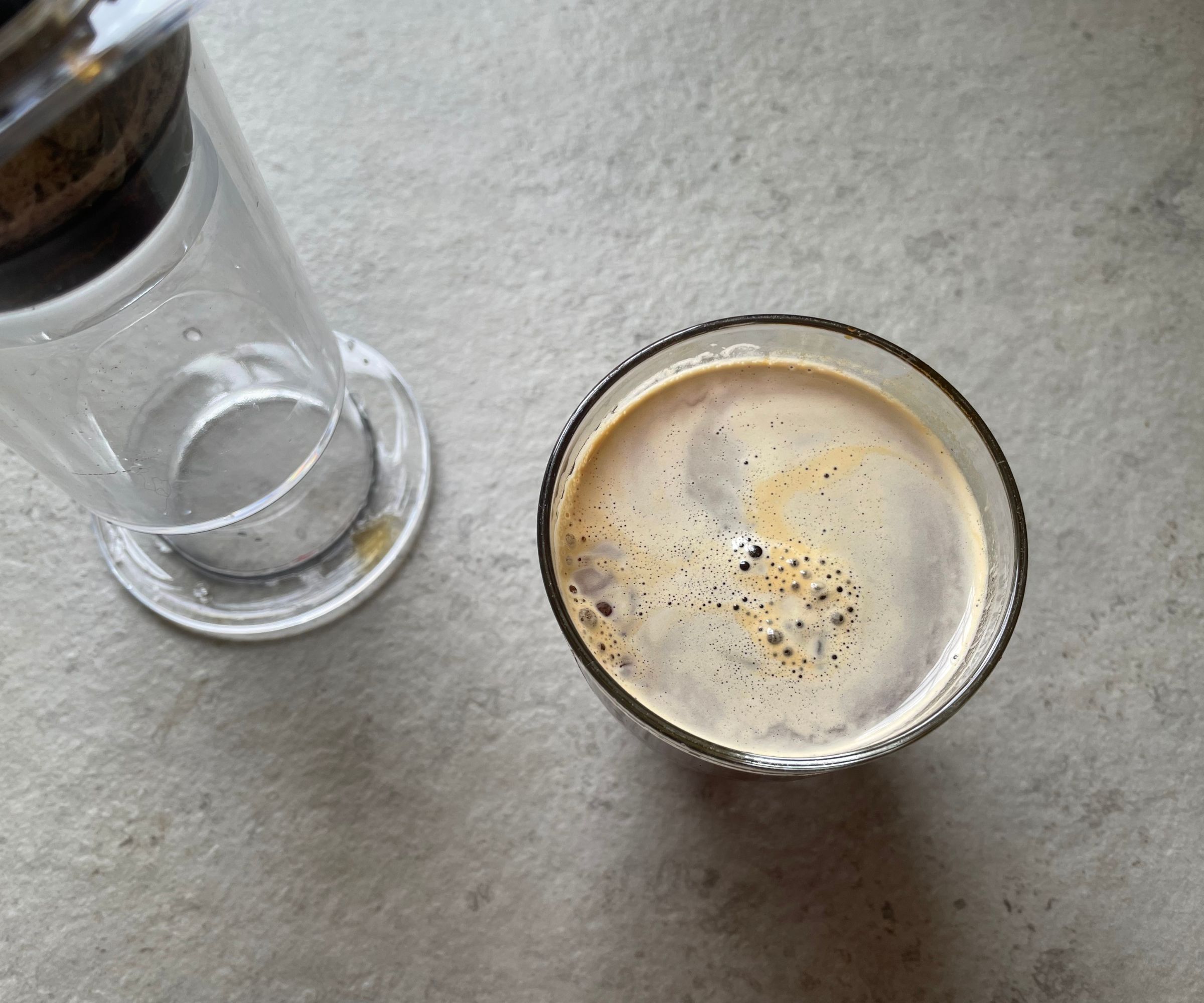
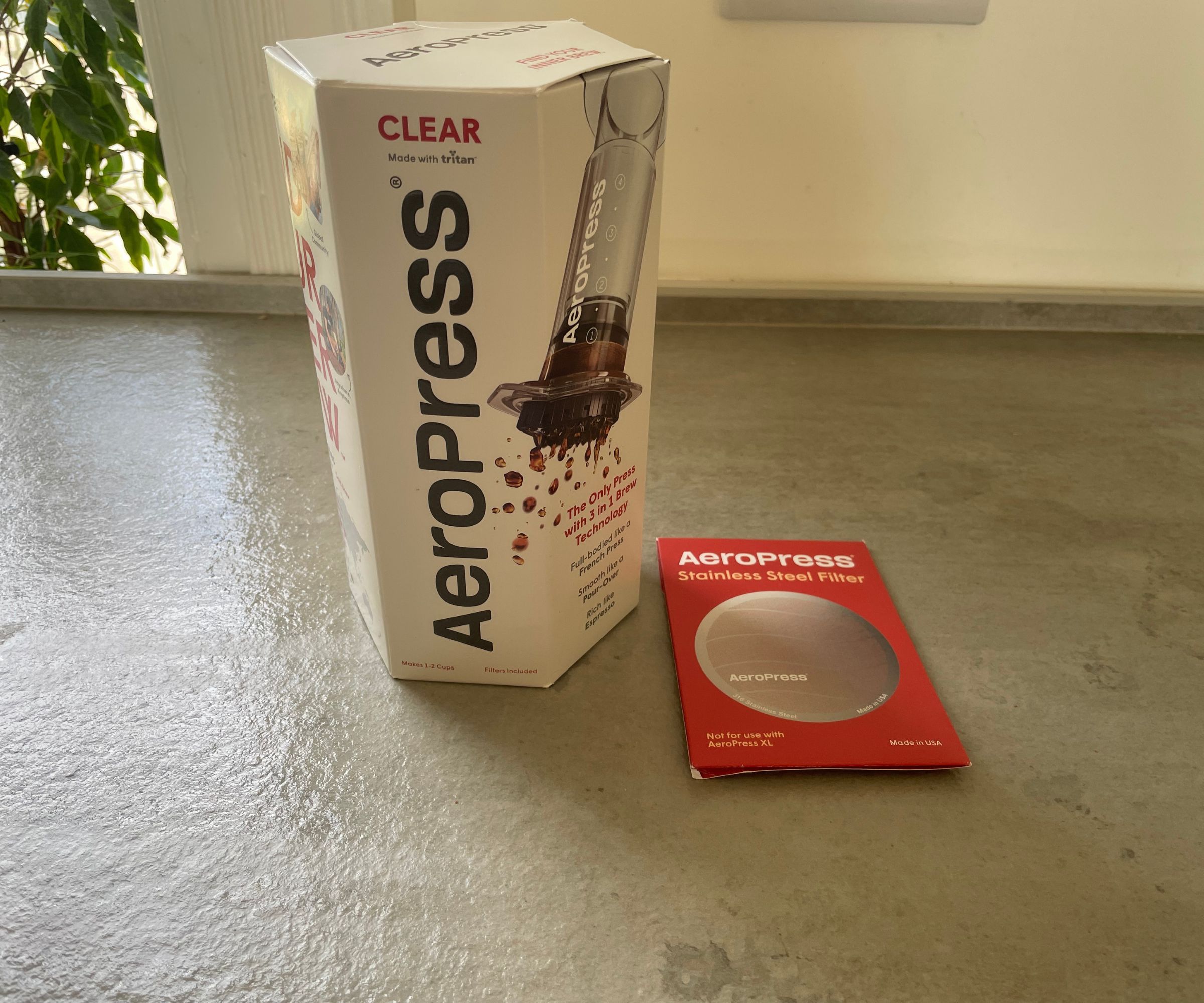
Specifications
Reasons to buy
Reasons to avoid
Not every office, hotel, or resort you go to will have a non-toxic coffee maker. If you're looking to take your healthy routine on the go, you won't find better than the AeroPress Original. It's lightweight, easy to use and clean, and the coffee is delicious. Just remember to take a mug with you, too!
Let's start by talking about the materials. This AeroPress is made from Tritan, which does feel a plasticky, but it's BPA-free, thick, and certainly won't break if you drop it. AeroPress says: 'All materials used in AeroPress coffee makers are FDA and EU approved for use in contact with food, and are free of BPA and phthalates.'
We were impressed with the taste tests. The coffee shots were remarkably delicious, with the syrupy texture and rich intensity of a proper espresso. The Americano also brought out the specialty notes of our beans. We could even see a light crema on top, which even the best drip coffee makers struggle to achieve.
It's really easy to hand wash, too. Take the base off, filter it out, and then rinse with warm soapy water. Just like the glass and stainless steel Premium model above, the entire AeroPress brewing and cleaning process is wrapped up in about five minutes – from start to finish.
In fact, the main differences between the original and premium models is aesthetics and portability. If you're not keen on the plasticky feel of the original (although it is BPA-free), you'll prefer the Premium model above. But if you'll be brewing from the hotel, office, Air BnB, ski lodge, or tent, you'll want the Original AeroPress with you.
Read more details in our full AeroPress Original review.
6. Best design
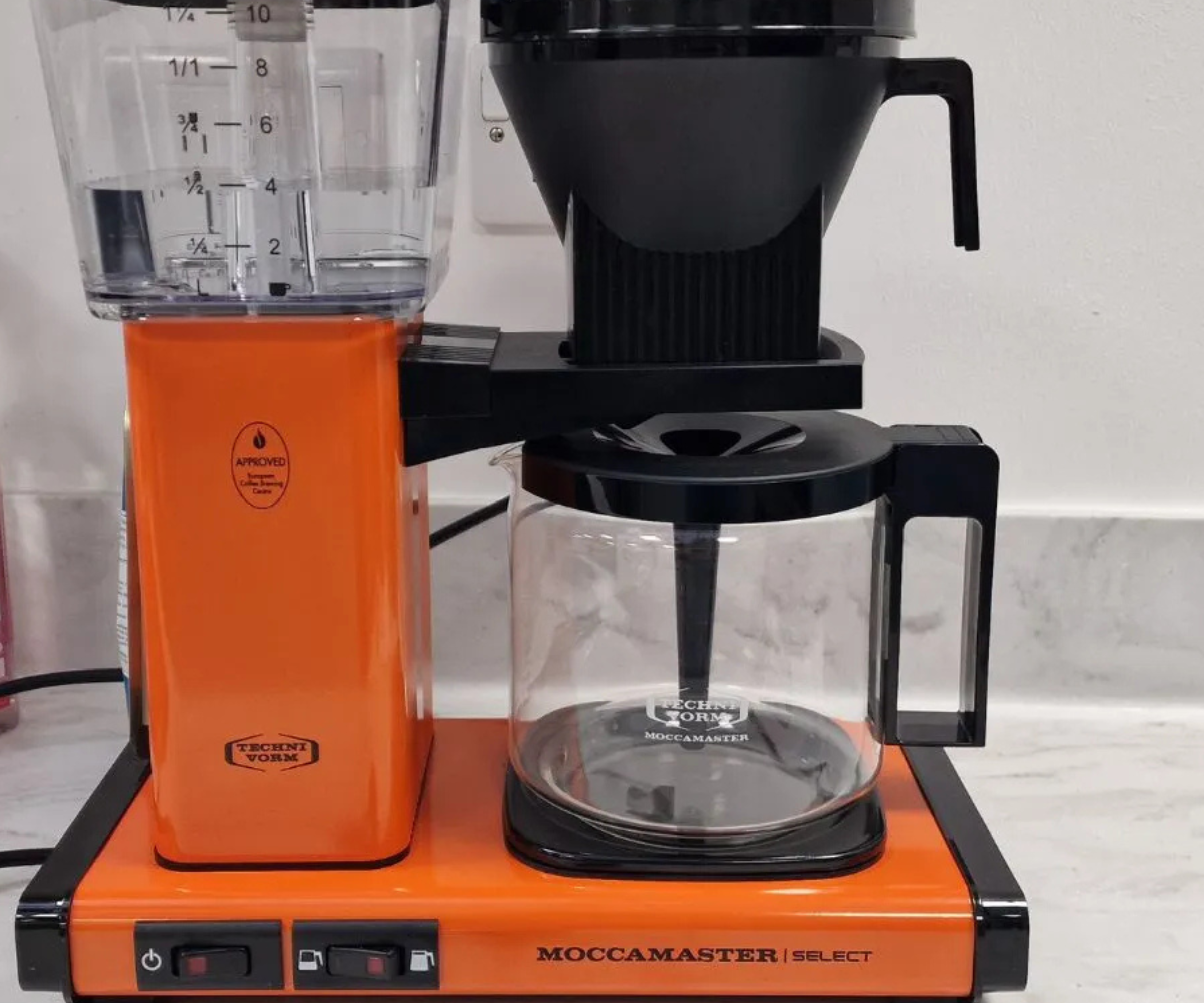
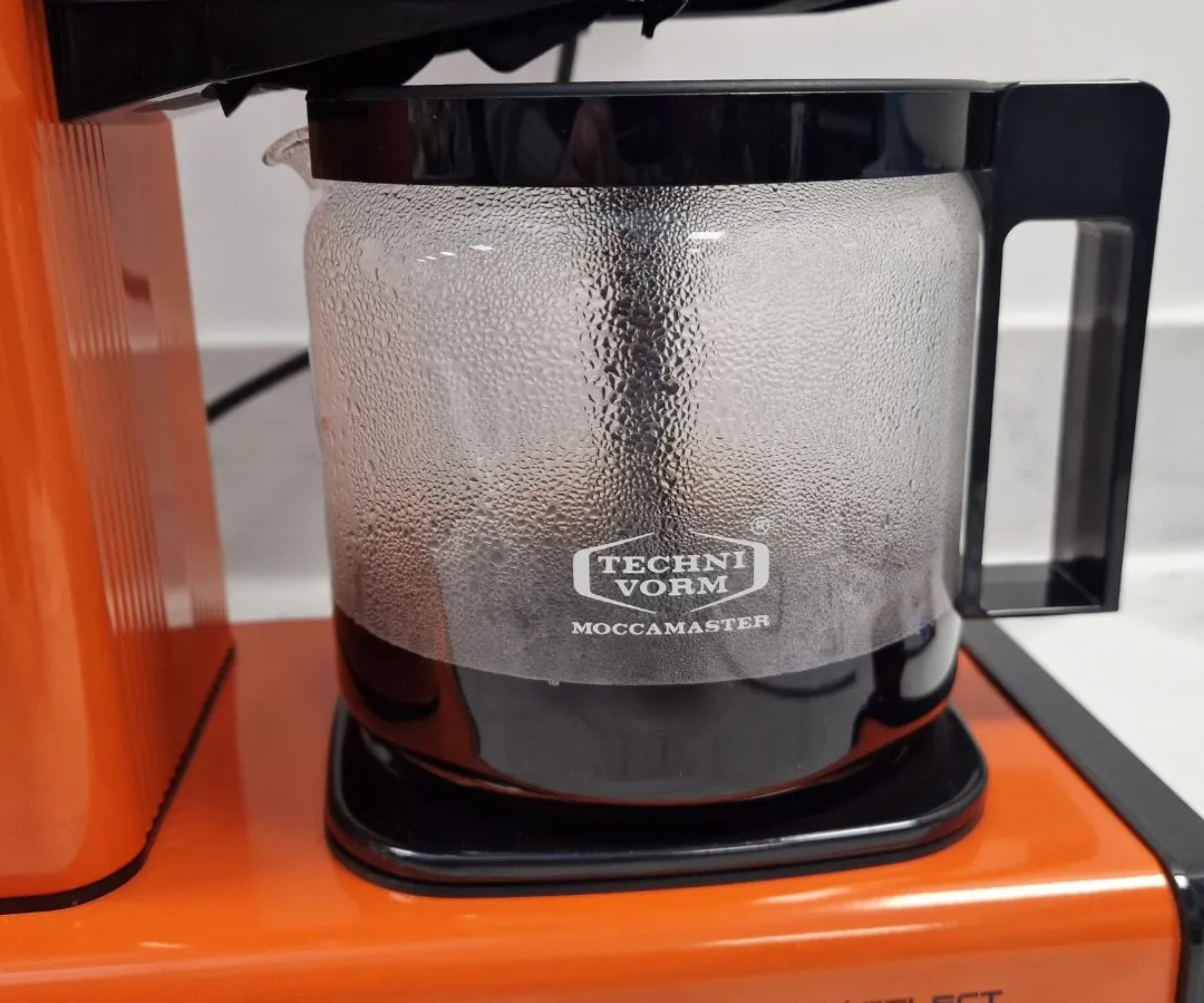
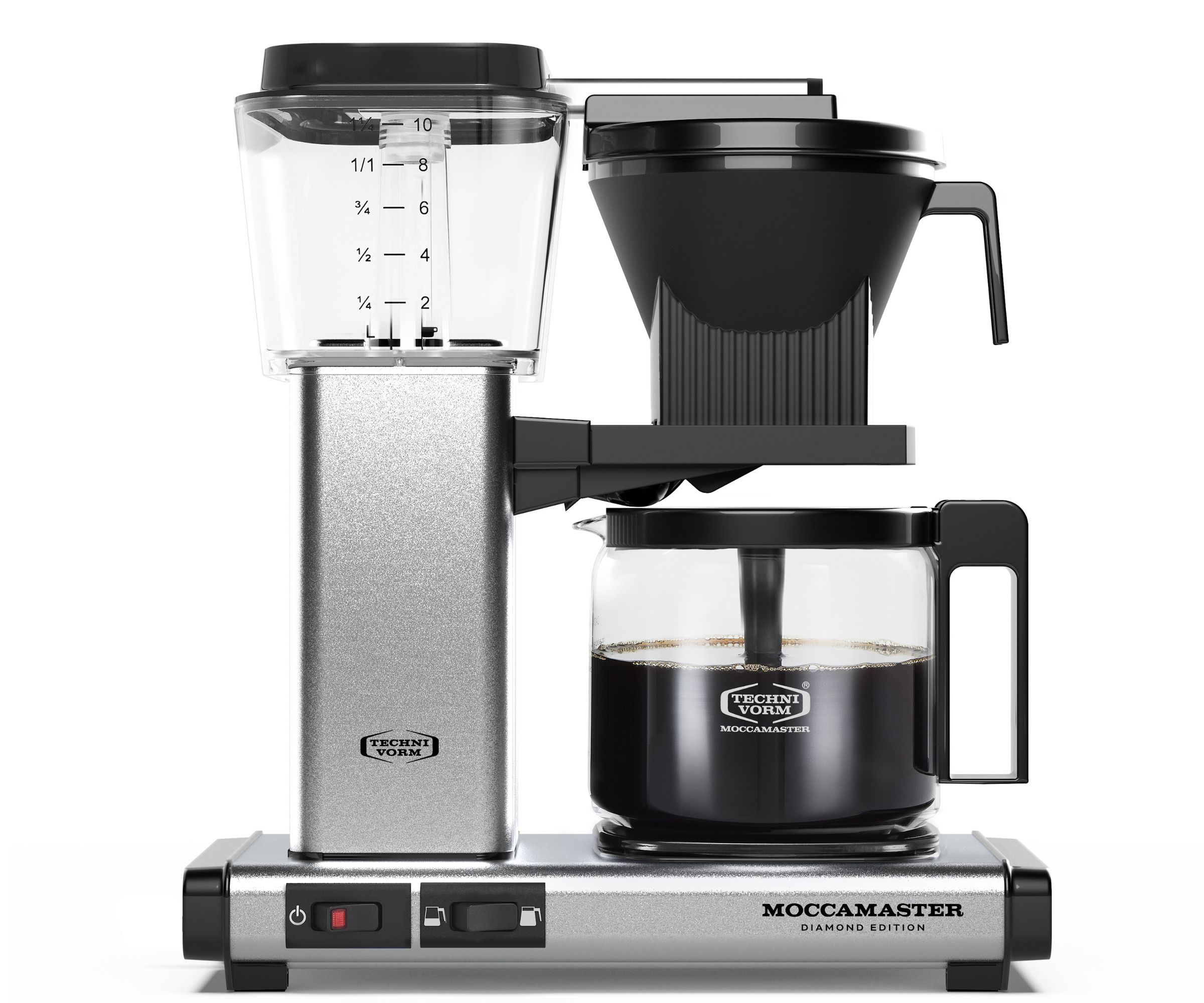
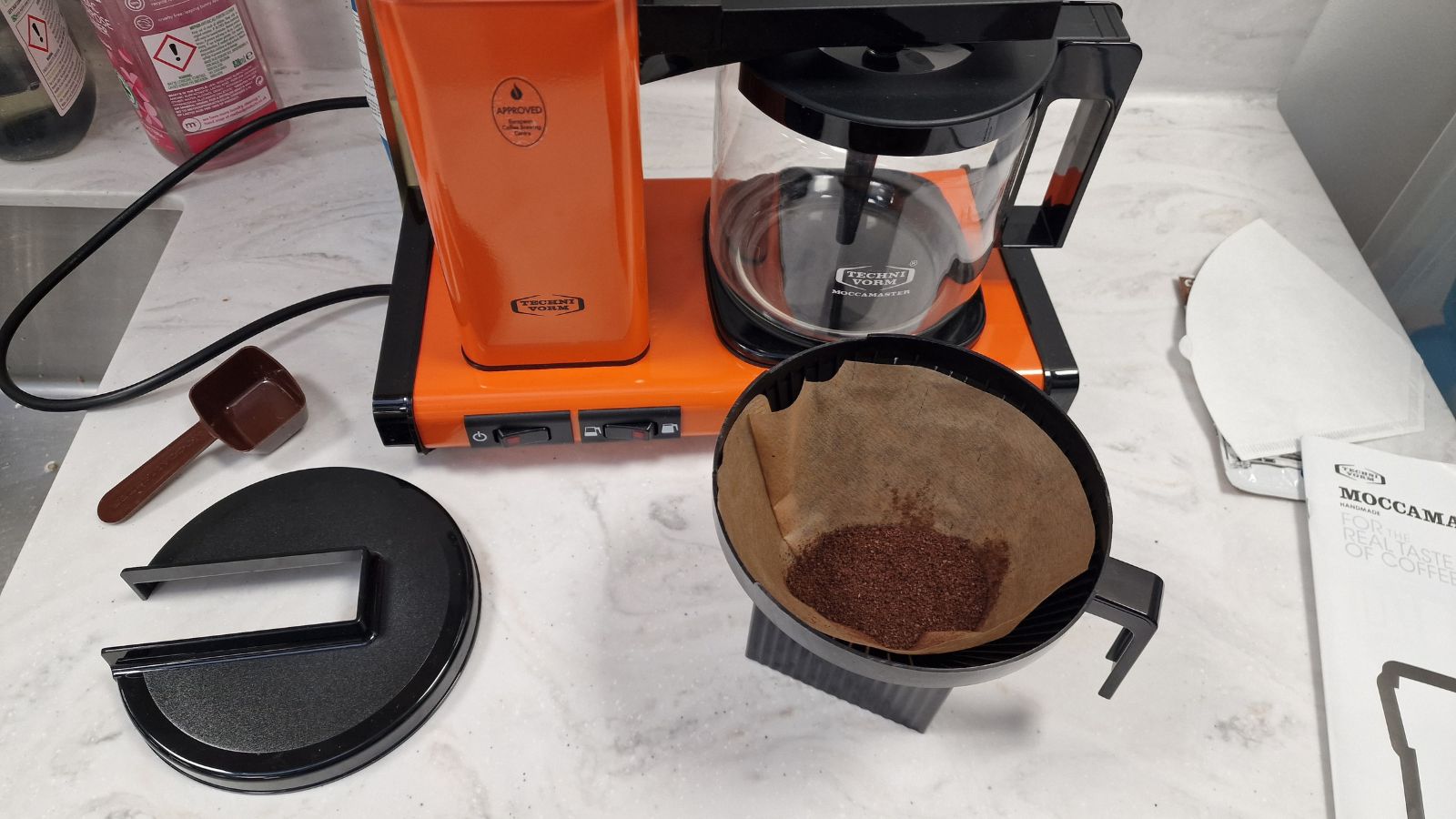
6. Technivorm Moccamaster KBGV Select
Our expert review:
Specifications
Reasons to buy
Reasons to avoid
Cute, colorful, and safer for your brews, too. The Moccamaster is handmade in the Netherlands with stainless steel and BPA-free plastic materials. The retro, boxy design looks great in a wide range of shades, with an option to complement any kitchen color palette. There are bold primary hues to pop against white walls, as well as softer greens, pinks, and blues.
Looks aside, the Technivorm Moccamaster is a real kitchen workhorse. It's a drip coffee maker that works quickly and quietly to brew a whole 10-cup carafe in as little as six minutes. Our coffee expert and ex-barista, Laura Honey, was impressed in the test kitchen. As were the Specialty Coffee Association and the European Coffee Brewing Center: this machine is certified gold by both organizations.
A word to the wise: this coffee maker is a little high-maintenance. Moccamaster recommends descaling your machine after every 100 cycles, and washing each component by hand. The warranty is a sweetener though: every Moccamaster has a 5-year warranty.
Another downside is that you do pay a lot of money for basic functions. We loved the unique aesthetic, but were somewhat disappointed that we didn’t get more from it in terms of coffee customizability or automation. If you don't mind this simplicity but would like to pay less, look to the OXO at the top of this list. It's not a design centrepiece like the Moccamaster, but it does a very good job for a better price.
Our Technivorm Moccamaster KBGV Select review has more details.
8. Best Moka Pot
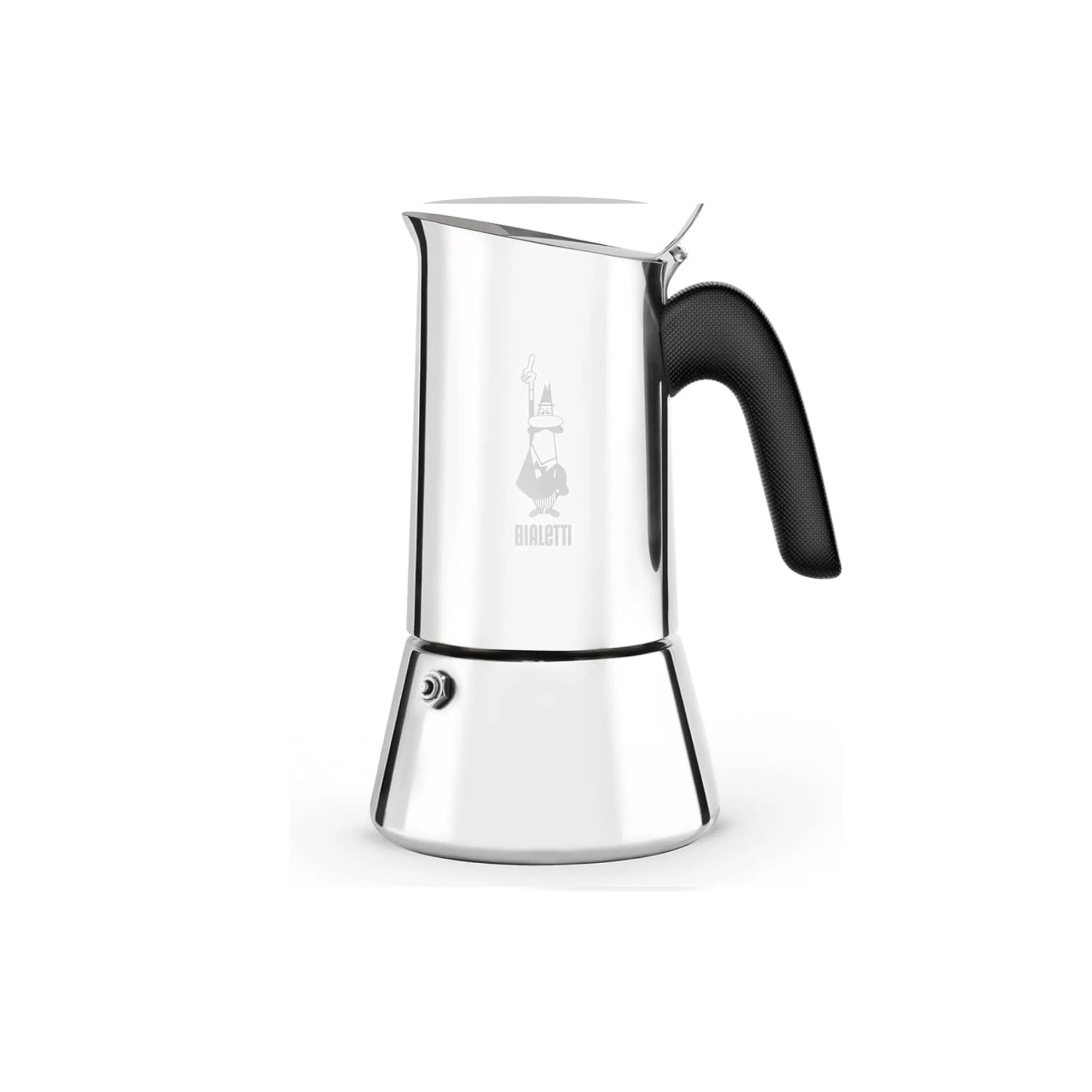
7. Bialetti Venus
Our expert review:
Specifications
Reasons to buy
Reasons to avoid
The Bialetti brand reigns supreme in the world of moka pots. The original Moka Express remains unbeaten in our tests, both in performance and charm. However, it is made of aluminum, which raises concerns about leaching and metallic tastes in your coffee. This round, shiny Bialetti Venus, on the other hand, is made from stainless steel, which is a safer alternative.
While stainless steel is heavier and requires some polishing to keep it looking smart, it’s actually more durable and compatible with induction stoves. In our tests, we also found that the stainless steel construction retains heat better, keeping your coffee warmer for longer than aluminum pots.
The flavor was of course, great. The Venus delivers the same rich, bold, and full-bodied coffee you’d expect from any Bialetti moka pot.
Our only real criticism is that we mised the retro aesthetics of the classic moka pot. The Venus is more of a spherical oblong. Plus, the different build style means that the gasket is sealed with silicone, which needs to be replaced every year or so to ensure reliability. But if you love Moka coffee and prefer to use safer stainless steel, this is the safest option you can get.
Our guide to the best Moka pots has more details.
Best French press
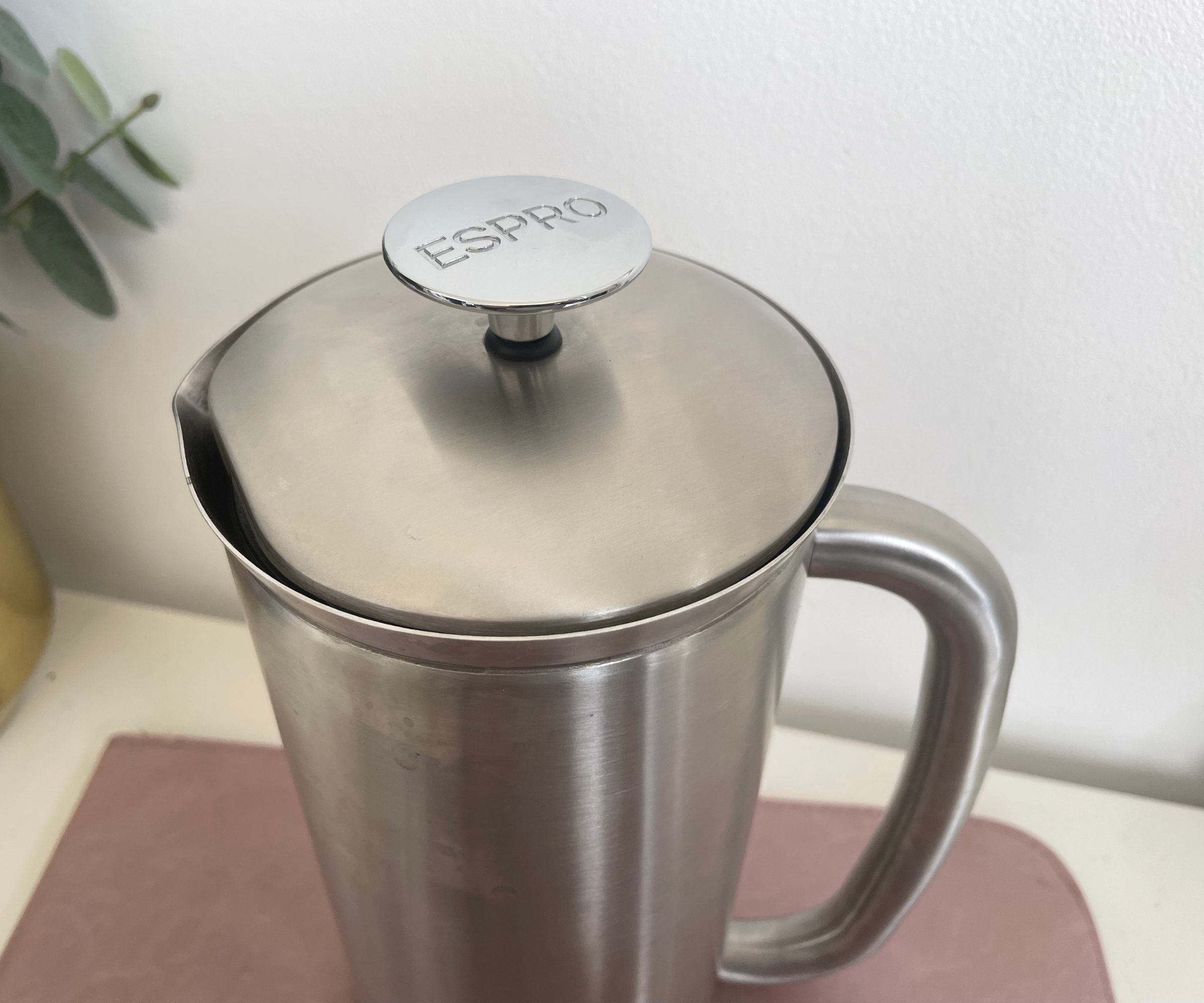
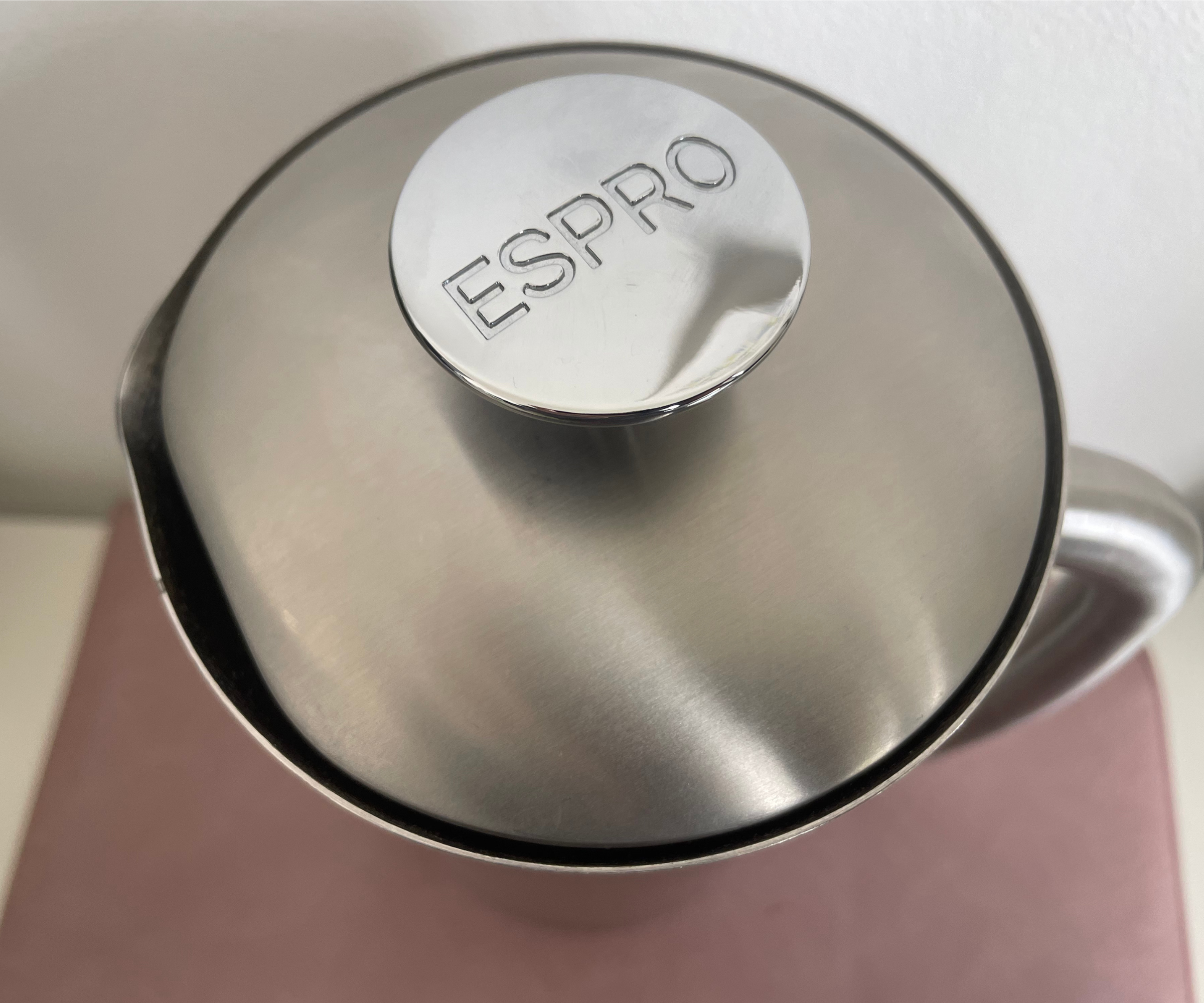
8. Espro P7 French Press
Our expert review:
Specifications
Reasons to buy
Reasons to avoid
There’s no question: Espro makes the best French press on the market. As a team, we’ve tested dozens of models, and the Espro consistently delivered a deliciously rich, grit-free cup every time. The best part is that it's crafted from high-quality stainless steel and free from BPA and PFAS. So, it’s as safe as it is durable.
The two-stage filtration system and ultra-tight seal stood out to us in the tests. It completely eliminates sediment, giving you nothing but smooth, full-bodied coffee with every pour. We also made an amazing cold brew and homemade fruit teas, too.
We tested the large 32 oz. version, which brews enough to serve a large family or a small brunch party. Our expert tester, Lydia, actually loved the Espro so much she took it home from the test kitchen, and now she uses it daily for herself and her partner. She says, 'Thanks to its double-wall insulation, it keeps the coffee hot for hours. I find it great for working from home. If you’re busy or just a bit forgetful, you’ll never come back to a cold carafe.'
The only shame is that the stainless steel body isn’t transparent, so you can’t watch the brewing process. But the heat retention and non-toxic credentials are a worthwhile trade-off. It is well worth the investment.
You can read more in our guide to the best French presses.
Where to shop non-toxic coffee items
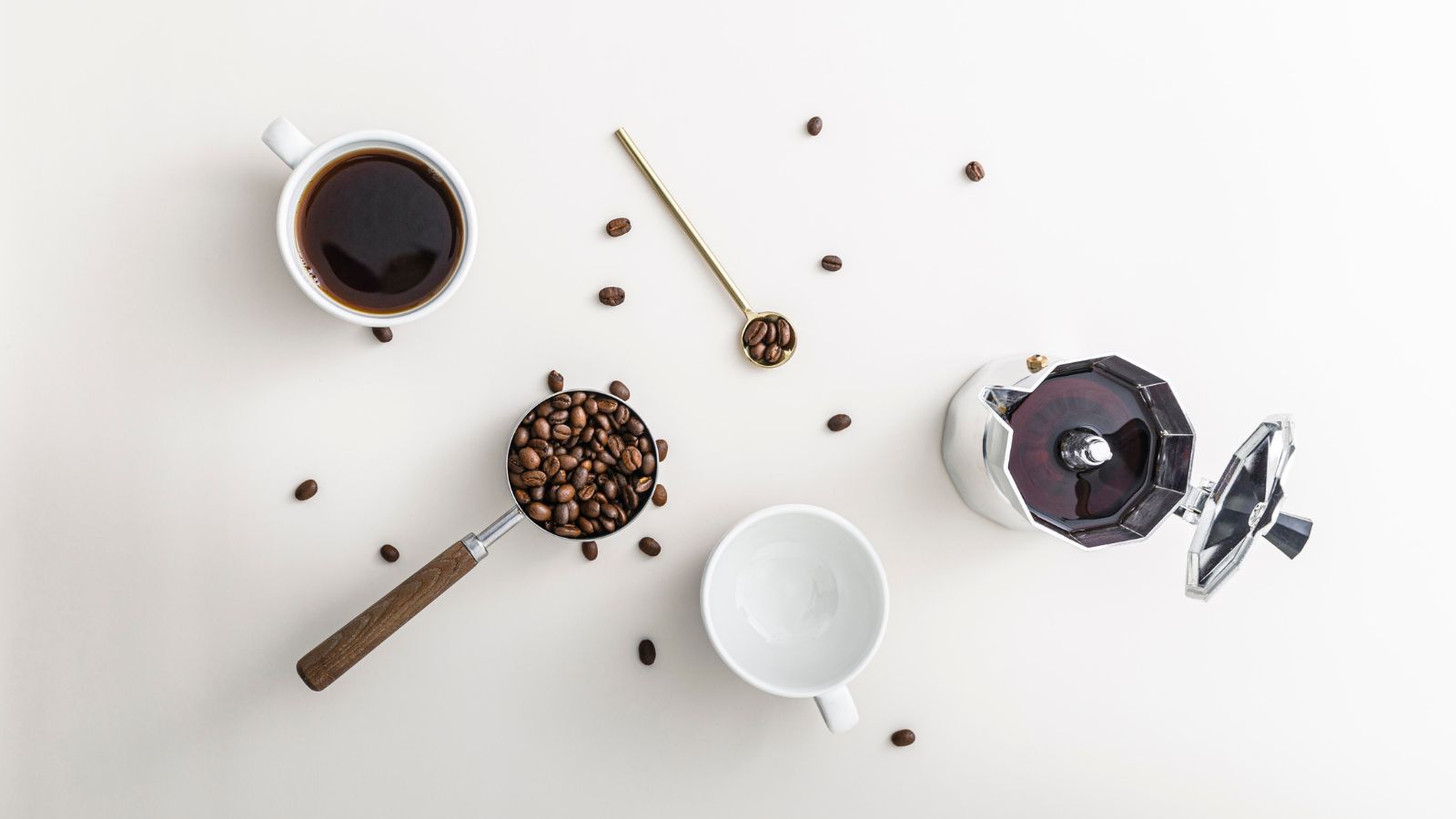
If you haven't found your dream coffee machine on this list, we found this shopping filter at Sur La Table that provides more stainless steel and plastic-free options. You'll see some familiar designs from this list, as well as lesser known brands that we haven't tested or rated.
If you want to shop for high-quality coffee accessories, (like, bamboo scoops and natural travel cups), our kitchen appliances editor, Lydia, has written a guide to her favorite plastic-free coffee accessories, here. She's included her favorite sustainable cleaning products there, too.
If you're ready to refresh the rest of your kitchen appliances, check our guide to the best non-toxic kitchen appliances (which includes kettles, frying pans, and more) and the best non-toxic air fryers.
There's more guidance on how to choose healthier appliances and which buzzwords to trust in our guide to toxin-free cookware.
How we test
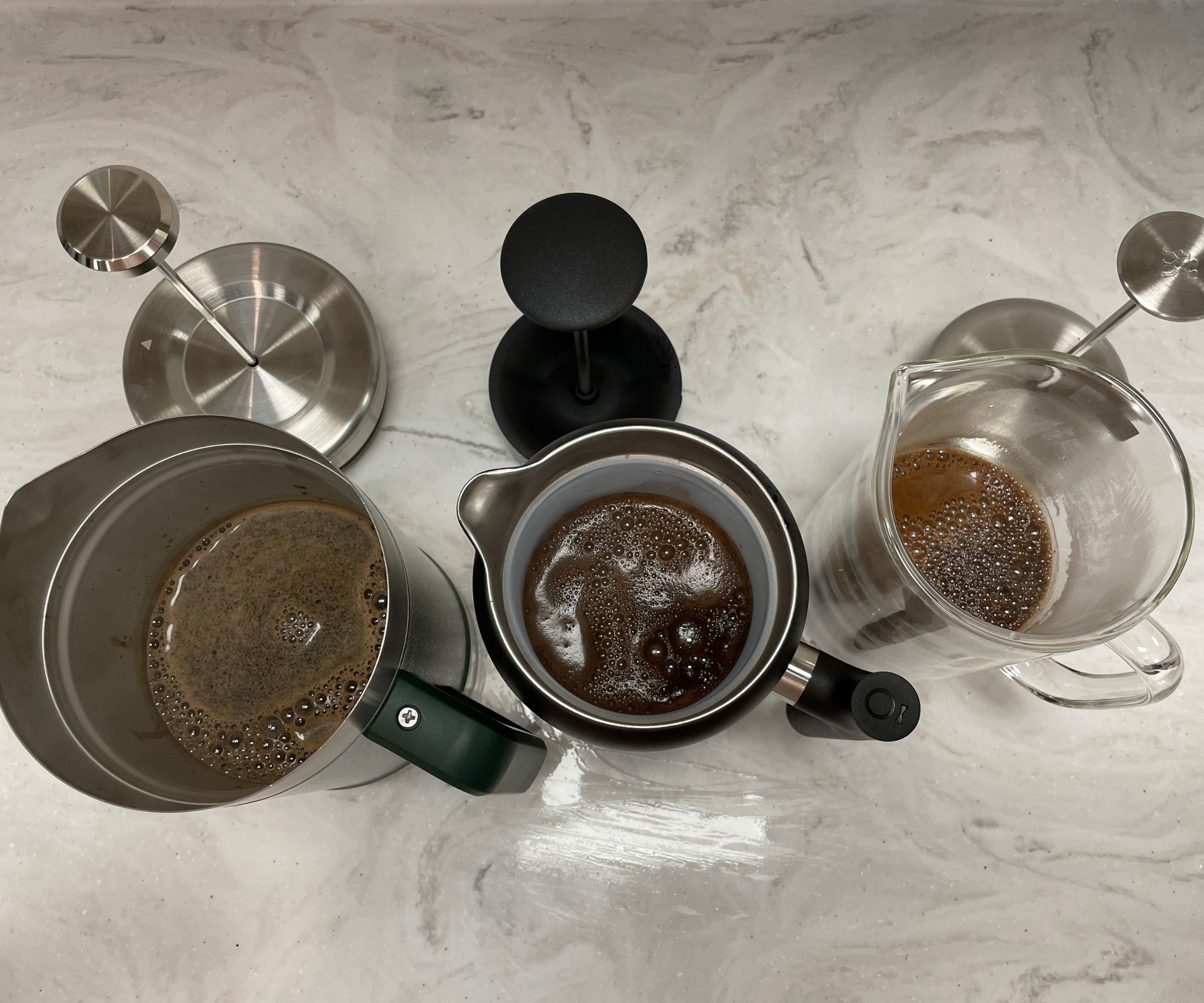
At Homes & Gardens, we have a rigorous testing process for all of our coffee makers. This enables us to score coffee makers both individually and against other models on the market.
We start with our research. We're always on the lookout for the best coffee makers on the market. Once we have found one with BPA-free components, we order it to the test kitchen or send it to one of our expert testers at home, where they can carry out the rigorous testing criteria.
Once we have the coffee maker in our hands, we get testing. This begins with unboxing, which might sound small, but it's an important tell of a brand's attention to detail. We'll let you know whether we get any extra accessories and what our first impressions are of the coffee maker. Here's where we'll talk about the size, style, build quality, and anything else that jumps out at us aesthetically.
Next, we'll get brewing. We make notes on how easy the coffee maker is to set up and start using. Then, we'll time how long the coffee maker takes to brew different quantities of coffee. We'll start at one cup (if the machine can do that) and work up to its maximum capacity. After each brew, we assess the flavor of each cup, the range of the machine, how long it keeps coffee warm for, the ease of cleaning, and the all-important price. Where applicable, we experiment with special features, such as integrated grinders and milk frothers.
Once we are happy that we've tested everything that we can, we'll take a step back and think about how the coffee maker compares to other models. We'll read through online reviews to get a sense of what customers are saying and then, bringing all that information together, our team will let you know who we think it suits and whether it's good value for money. As you can see, we leave no stone unturned.
If you’re interested and want to find out more, you can read all about the process in our how we test coffee makers page.
Meet our testing team
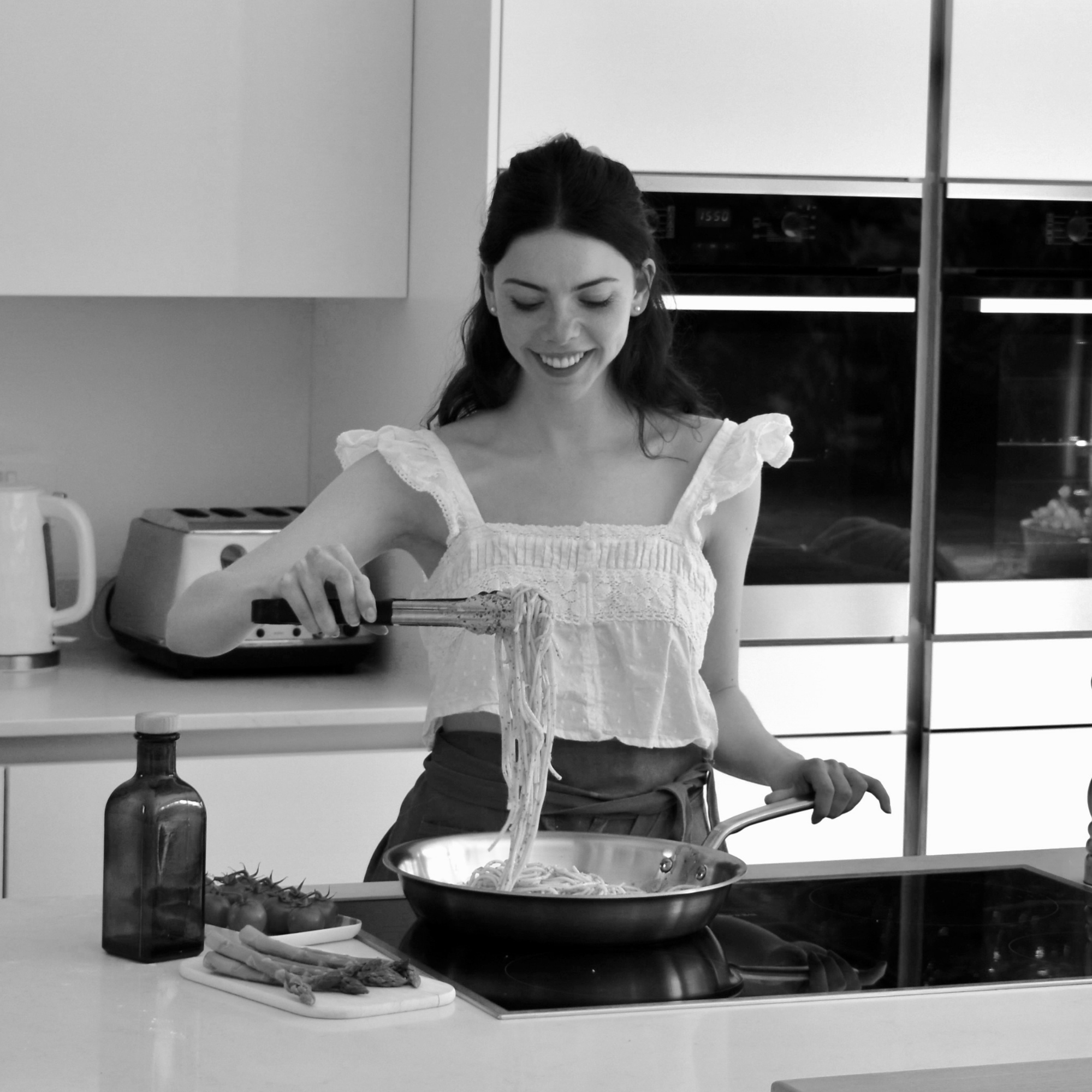
Lydia is a trained cook, who loves coffee. She has attended masterclasses at Illy's University of Coffee, shadowed professional baristas, attended coffee masterclasses, and toured roasteries to master the art of coffee. Her drink of choice is a frothy, Italian cappuccino (alongside a croissant, of course). She also leads testing on non-toxic kitchenware for Homes & Gardens, writing guides to the best non-toxic air fryers and the best non-toxic frying pans, too.

Laura has tested over 60 coffee makers for Homes & Gardens. As a fully qualified barista, she's our expert in all things coffee – and she's even delved into matcha, too. She has also interviewed Q-Graders and world-leading experts in the coffee industry, so has an intimate knowledge of the industry.
FAQs
Are coffee makers toxic?
Some cheaper coffee makers use plastics where they should use stainless steel or glass. When heated to higher temperatures, these can release harmful chemicals into your brew. Over time, these can be harmful, but they aren’t any cause for immediate concern. We have an article where medical experts answered our question, ‘Are coffee makers toxic?’ if you would like more information.
What are toxins anyway?
When kitchenware brands talk about ‘toxins’, they’re usually referring to PFAS or BPA.
First used in the 1940s, PFAS are chemicals that resist grease, oil, water, and heat. These chemicals are super stubborn, so they’re often found in products designed to be stain-resistant, clean, and dry (like cookware, cleaning products, and carpets). You may know them as 'forever chemicals.'
The FDA says, 'Exposure to certain PFAS types has been linked to significant health issues, such as increased cholesterol, high blood pressure, developmental effects, reduced immune response, altered liver function, and increased cancer risk.'
Similarly, BPA is an industrial chemical used to make polycarbonate, a hard, clear plastic, which is used in many consumer products. When heated to high temperatures, it can leach into your food or drink and affect hormonal balance.
Put simply, non-toxic kitchenware is designed to be safe to cook, eat and drink from. You can find more information in my guide to non-toxic cookware.
Are coffee beans toxic?
There has been lots of debate around this topic, but experts say not to worry. Coffee beans have recently been praised for their health benefits by the gut-health community, namely Tim Spector. The biggest residual concern is that when coffee beans are roasted, some reach temperatures high enough to burn them, forming acrylamides, which can have negative health effects. Buying premium beans and lighter roasts can help to avoid this concern.
How do you find the best coffee maker deals?
It's actually our full-time job. All year round, we research the best coffee makers, exploring the newest models, rigorously testing popular machines, and tracking price trends to identify the best coffee makers with standout features, value, good design, and reliability.
We note down our top six models in this guide, as well as the ones that just missed the list, so we can document price drops and compare prices – so we always known when the biggest discounts hit.
With years of experience, I know that Black Friday is one of the best time to shop premium, non-toxic appliances for less. Amazon is unbeatable for its vast selection, while Walmart and Best Buy excel in appliance sales, and Target and Wayfair are my go-tos for bundle offers and good-looking espresso machine discounts. I’m always on the lookout for value-packed bundles that include extras like milk frothers, coffee pods, or extended warranties, so you get the most out of every purchase.
Sign up to the Homes & Gardens newsletter
Design expertise in your inbox – from inspiring decorating ideas and beautiful celebrity homes to practical gardening advice and shopping round-ups.

Lydia is the Kitchen Appliances Editor for Homes & Gardens, testing everything from air fryers and mixers to juicers and coffee machines. She trained in Culinary Arts at Leiths School of Food & Wine and previously served as the Recipe Editor for Mindful Chef.
- Laura HoneyeCommerce Editor
-
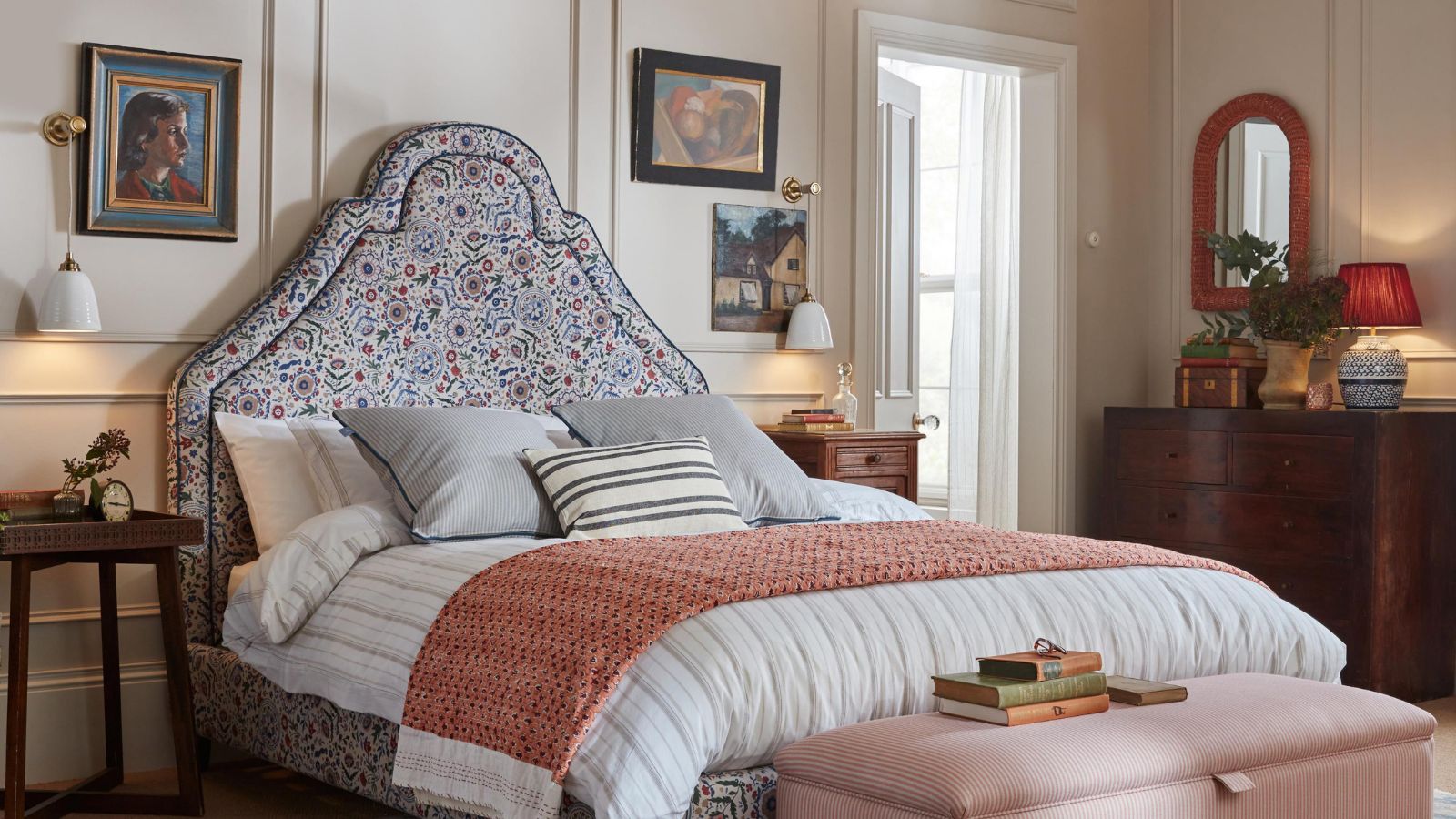 I only use this one storage solution to stash my out-of-season clothes – it makes moving and tidying oh-so easy
I only use this one storage solution to stash my out-of-season clothes – it makes moving and tidying oh-so easyStorage bags with windows make lesser-used garments a breeze to find
By Eve Smallman
-
 Bethenny Frankel says this affordable but 'expensive-looking' silverware set is the perfect stand-in for an iconic $2,050 version – recreate the look for under $60
Bethenny Frankel says this affordable but 'expensive-looking' silverware set is the perfect stand-in for an iconic $2,050 version – recreate the look for under $60Store your flatware in style with the RHONY's flashy (but affordable) egg-shaped flatware recommendation – and get the look no matter your budget
By Sophie Edwards